
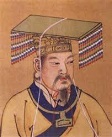

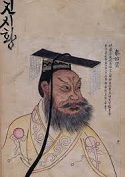














A Quick History of the Chinese Emperors |
By T.L. Winslow (TLW), the Historyscoper™ |
© Copyright by T.L. Winslow. All Rights Reserved. |
Last Update: Sept. 27, 2019. |



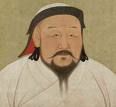





Westerners are not only known as history ignoramuses, but double dumbass history ignoramuses when it comes to the Chinese emperors. Since I'm the one-and-only Historyscoper (tm), let me quickly bring you up to speed before you dive into my Historyscopes.
About 3000 B.C.E. the San Huang (Three Emperors) (Three Sovereigns and Five Emperors) Dynasty is founded, ruling China for the next three cents.
In -2953 Fu Xi Shi (d. -2852) becomes the first San Huang emperor of China.

In -2852 Fu Xi decrees the use of surnames (family names), causing each Chinese person to have three names, the surname listed first and coming from one of the 438 words in the sacred poem Po-Chia-Hsing, then the generation name taken from a poem of 30 characters adopted by each family, followed by the given name; Fu Xi dies, and Shen Nong (Nung) Shi (Yan Di) (d. -2737) becomes San Huang emperor #2, the alleged father of Chinese agriculture and first herbal doctor, writing Shen Nong's Herbal Classic, the first Chinese herbal.
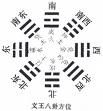
In -2737 tea is allegedly discovered when some leaves accidentally blow into Chinese emperor Shen Nong's pot of boiling water; Shen Nong dies, and Sui Ren Shi (d. -2697) becomes San Huang emperor #3, the alleged inventor of Chinese cooking along with Shen Nong. The N Chinese don't begin to practice tea drinking bigtime until the mid-8th cent. C.E. Tang Dynasty?

In -2697 Sui Ren Shi dies; beginning of the reign of Huang Di (Ti) (Gongsun) (Xuan Yuan Shi) (d. -2597), AKA the Yellow Emperor, who allegedly founds the nation of China; he makes his capital at You Xiong; he orders his officer Can Ji to create Chinese Characters (kanji).
In -2640 Chinese Empress Hsi-ling Chi (Shi) allegedly discovers Sericulture after a cocoon falls from a mulberry tree into her tea cup, and it unravels as she tries to remove it; divulging the secret of sericulture becomes a treasonable death penalty offense, and the Chinese monopoly eventually makes it worth its weight in gold; the best silk comes from Bombyx mori moths, which each lay up to 500 pinhead-sized eggs, which hatch in 20 days, and begin munching mulberry leaves, growing 70X in 18 days after shedding their skin 4X and increasing their weight by 10KX; they then begin spinning secreting double strands of fibroin which are coated with gumlike sericin before coming out of the spinneret at the rate of 10-15 in. per min., or up to 1 mi. in 48 hours; it takes 100 cocoons to make a silk scarf, 140 to make a tie, and 9K to make a kimono - ooh, bite your tongue?
In -2597 Huang Di dies, and Shao Hao (Jin Tian Shi) (d. -2513) becomes Wu Di king of China; his capital is at Qiu Fu.
In -2513 Shao Hao dies, and Zhuan Xu (Gao Yang Shi) (d. -2435) becomes Wu Di king of China; his capital is at Diqiu.
In -2435 Zhuan Xu dies, and Di Ku (Gao Xin Shi) (d. -2365) becomes Wu Di king of China, making Haojing his capital in the Yanshi country of Henan.
In -2365 Di Ku dies, and Zhi Di (d. -2357) becomes Wu Di king of China.
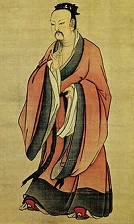
In -2357 Zhi Di dies, and Yao Di (Tang Yao) (d. -2255) becomes Wu Di king of China, making his capital at Qi, and allegedly inventing the game of Weiqi (Go) for his son Dan Zhu.
In -2255 Yao Di dies, and Shun Di (Yu Shun) (d. -2205) becomes Wu Di king of China, making his capital at Qi.

In -2205 Shun Di dies, and Xia Yu Di (Yu the Great) (d. -2197) founds the Xia (Hsia) Dynasty in China (ends -1783) (-2070 to -1600?) after he becomes a hero by controlling a catastrophic flooding of the Yellow River by dredging.
In -2197 Xia Yu Di dies, and his son Xia Qi (d. -2188) becomes Xia king #2 of China.
In -2188 Xia Qi dies, and his son Xia Tai Kang (d. -2159) becomes Xia king #3 of China, ruling from Zhen Xun (Gong Xian, Henen); the throne becomes hereditary.
In -2159 Xia Tai Kang dies, and Xia Zhong Kang (d. -2146) becomes Xia king #4 of China.
In -2146 Xia Zhong Kang dies, and Xia Xiang (d. -2079) becomes Xia king #5 of China, moving his kingdom to Shang.
In -2079 Xiao Xiang is assassinated by Han Zu, who is executed by Xia Shao Kang (d. -2057), who becomes Xia king #6 of China, awarding the Kingdom of Zeng to his youngest son Qu Lia.
In -2057 Xia Shao Kang dies, and Xia Zhu (d. -2040) becomes Xia king #7 of China.
In -2040 Xia Zhu dies, and Xia Huai (d. -2014) becomes Xia king #8 of China.
In -2014 Xia Huai dies, and Xia Man (d. -1996) becomes Xia king #9 of China.
In -1996 Xia Man dies, and Xia Xie (d. -1980) becomes Xia king #10 of China.
In -1980 Xia Xie dies, and Xia Bu Jiang (d. -1921) becomes Xia king #11 of China.
In -1921 Xia Bu Jiang dies, and Xia Pian (d. -1900) becomes Xia king #12 of China.
In -1900 Xia Pian dies, and Xia Li (d. -1879) becomes Xia king #13 of China.
In -1879 Xia Li dies, and Xia Kung Jia (d. -1848) becomes Xia king #14 of China.
In -1848 Xia Kung Jia dies, and Xia Bo (d. -1837) becomes Xia king #15 of China.
In -1837 Xia Bo dies, and Xia Fa (d. -1818) becomes Xia king #16 of China.
In -1818 Xia Fa dies, and Xia Jie (Hsia Chieh) (the Tyrant) becomes Xia king #17 of China; the first cruel Chinese king, he amuses himself by having 3K people drowned in a lake of wine - cruel, or euthanasia?
In -1783 the army of Shang Tang (d. -1753) surrounds decadent king Xia Jie (Hsia Chieh) at Xia Tai, and he is captured and exiled to Nanchao; the Hsia Dynasty (begun -2205) ends, and the Shang Dynasty begins (ends -1050), with capital at Anyang in the N Henan province, building walled cities with temples, and known for priest-kings who use elaborate bronze containers with bowed handles in their religious ceremonies - ah, you're no rich prince?
In -1753 Shang Tang dies, and Shang Tai Jia (d. -1720) becomes Shang king #2 of China.
In -1720 Shang Tai Jia dies, and Shang Wo Ding (d. -1691) becomes Shang king #3 of China.
In -1691 Shang Wo Ding dies, and Shang Tai Kang (d. -1666) becomes Shang king #4 of China.
In -1666 Shang Tai Kang dies, and Shang Xiao Jia (d. -1649) becomes Shang king #5 of China.
In -1649 Shang Xiao Jia dies, and Shang Yong Ji (d. -1637) becomes Shang king #6 of China.
In -1637 Shang Yong Ji dies, and Shang Tai Wu (d. -1562) becomes Shang king #7 of China.
In -1562 Shang Tai Wu dies, and Shang Zhong Ding (d. -1549) becomes Shang king #8 of China, moving the capital from Hao to Xico, and bringing an end to the Deng Kingdom.
In -1549 Shang Zhong Ding dies, and Shang Wai Ren (d. -1534) becomes Shang king #9 of China, dealing with a revolt by the Huai and Xian tribes.
In -1534 Shang Wai Ren dies, and Shang He Tan Jia (d. -1525) becomes Shang king #10 of China, moving the capital from Xico to Xiang.
In -1525 Shang He Tan Jia dies, and Shang Zu Yi (d. -1506) becomes Shang king #11 of China, moving the capital from Xiang to Geng to Xing.
In -1506 Shang Zu Yi dies, and Shang Zu Xing (d. -1490) becomes Shang king #12 of China.
In -1490 Shang Zu Xing dies, and Shang Wo Jia (d. -1465) becomes Shang king #13 of China.
In -1465 Shang Wo Jia dies, and Shang Zu Ding (d. -1433) becomes Shang king #14 of China.
In -1433 Shang Zu Ding dies, and Shang Nan Geng (d. -1408) becomes Shang king #15 of China.
In -1408 Shang Nan Geng dies, and Shang Yang Jia (d. -1401) becomes Shang king #16 of China.
In -1401 Shang Yang Jia dies, and Shang Pan Kang (d. -1372) becomes Shang king #17 of China, moving the capital from Yan to Beimeng.
In -1372 Shang Pan Kang dies, and Shang Xiao Xing (d. -1352) becomes Shang king #18 of China.
In -1349 Shang Ziao Sing dies, and Shang Xiao Yi (d. -1324) becomes Shang king #19 of China.
In -1324 Shang Xiao Yi dies, and Shang Wu Ding (d. -1265) becomes Shang king #20 of China.
In -1265 Shang Wu Ding dies, and Shang Zu Geng (d. -1258) becomes Shang king #21 of China.
In -1258 Shang Zu Geng dies, and Shang Zu Jia (d. -1235) becomes Shang king #22 of China.
In -1235 Shang Zu Jia dies, and Shang Bing Xing (d. -1219) becomes Shang king #23 of China.
In -1219 Shang Bing Xing dies, and Shang Geng Ding (d. -1198) becomes Shang king #24 of China.
In -1198 Shang Geng Ding dies, and Shang Wu Yi (d. -1194) becomes Shang king #25 of China (until -1194), becoming known for his cruelty and arrogance, playing a game of Liubo against God - on the last day of his life?
In -1194 Shang Wu Yi dies, and Shang Tai Ding (d. -1192) becomes Shang #26 king of China.
In -1192 Shang Tai Ding dies, and Shang Di Yi (d. -1154) becomes Shang king #27 of China.
In -1154 Shang Di Yi dies, and Shang Zhou (d. -1134) becomes Shang king #28 of China; the cruelest king in Chinese history?; known for the invention of chopsticks (kuaizi) (bad luck to leave them standing in food straight up?) - ouch that must hurt?
In -1134 Shang Zhou dies, and Chou-hsin (d. -1122) becomes Shang king #29 of China, becoming known as an evil debauched despot who is into tasty aphrodisiacs, incl. Hunting Lion (bear paws, rhino horn, human urine), Celestial Thunder (peacock tongues, chili powder, sperm from teen boys), and Three-Day Glory (soy beans, ginseng, ox penis, dried human placenta). About this time the first cast copper coins are produced in China under the Shang Dynasty.

In -1122 Zhou Wu Wang (d. -1119) (-1046 to -1043?) and his father Wen revolt against Chou-hsin, ending the Shang Dynasty and founding the Xi (Northern) Zhou (Chou) Dynasty (China's 3rd dynasty) (ends -256), awarding Korea to Chinese prince-scholar Qi Zi (Ji-zi) (Ki Tse), who founds the independent Kingdom of Choson (Chosen) (Joseon) (ends -194/-108). about this time the city of Peiping (later Peking and Beijing) ("northern capital") (modern pop. 18.6M/24.9M) in NE China 90 mi. NE of the Gulf of Pohai and 12 mi. W of the Pei River is founded as a frontier outpost; it is walled about 1045 B.C.E.
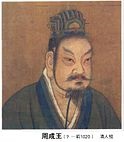
In -1043 Zhou Wu Wang dies, and next year his son Zhou Cheng Wang (d. -1006) becomes Xi Zhou king #2 of China, with his uncle the Duke of Zhou as his regent, going on to establish the capital in Luoyang, defeat several barbarian tribes along the border, and defeat a rebellion by his uncles Cai Shu, Guan Shu, and Huo Shu.
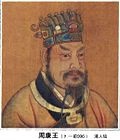
In -1006 (1020?) Cheng dies, and next year his son Kang of Zhou (d. -978) becomes Zhou king #3 of China.
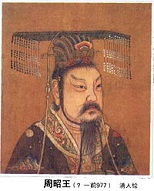
In -978 Zhou Kang Wang dies, and next year his son Zhou Zhao Wang (Ji Xia) (d. -957) becomes Xi Zhou king #4 of China, going on to wage a disastrous war with the Chu confederation, ending his dynasty's expansion and starting its decline.
In -957 Zhou Zhao Wang dies, and in -956 his son Zhou Mu Wang (d. -918) becomes Xi Zhou king #5 of China.


We're up to 1000 B.C.E., and don't say it, my head is swimming with Chinese alphabet soup too. Guess what, it only gets worse.
In -936 Zhou Mu Wang dies, and Zhou Gong Wang (d. -934) becomes Xi Zhou king #6 of China.
In -934 Zhou Gong Wang dies, and Zhou Yi Wang (d. -909) becomes Xi Zhou king #7 of China.
In -909 Zhou Yi Wang dies, and Zhou Xiao Wang (d. -894) becomes Xi Zhou king #8 of China, ordering the Duke of Shen to attack the Quan Rong in NW China.
On Apr. 21, -899 there is a solar eclipse, causing a "double dawn" over Zheng, China.
In -894 Zhou Xiao Wang dies, and Zhou Yi Wang (d. -878) becomes Xi Zhou king #9 of China.
In -878 Zhou Yi Wang dies, and Zhou Li Wang (d. -827) becomes Xi Zhou king #10 of China.
In -827 Zhou Li Wang dies, and Zhou Xuan Wang (d. -781) becomes Xi Zhou king #11 of China.
In -800 the Axial (Axis) Age of Karl Jaspers begins (ends -200), when "the great world traditions that have continued to nourish humanity came into being: Confucianism and Daoism in China; Hinduism and Buddhism in India; monotheism in Israel; and philosophical rationalism in Greece", and where "What mattered was not what you believed but how you behaved", and the concept of kenosis (Greek for emptying), "spirituality of self-surrender" is the goal.
In -781 Zhou Xuan Wang dies, and Zhou You Wang (d. -771) becomes Xi Zhou king #12 of China.
In -771 northern barbarians overrun the Western Chou Dynasty; Zhou You Wang dies, ending the Xi Zhou Dynasty, and Zhou Ping Wang (d. -720) founds the Dong (Western) Zhou Dynasty in China; the capital is moved to the capital is moved to Luoyang (Loyang) at the confluence of the Luo and Yellow Rivers, beginning the Spring and Autumn Period of the Xi Zhou (Chou) Dynasty (ends -401); dukes become powerful and establish their own kingdoms.
In June -770 the first Dragon Boat Race is held at Dongting Lake on the banks of the Yangtze River.
In -753 the Old Guo Kingdom is reestablished in China.
In -722 the Chun Qiu (Ch'un-Ch'iu) (Chin. "spring and autumn") chronological record is started in China, recording events of the reigns of 12 rulers of Lu till just before Confucius' death in -479.
In -720 Zhou Ping Wang dies, and Zhou Huan Wang (d. -697) becomes Dong Zhou king #2 of China.
In -697 Zhou Huan Wang dies, and Zhou Zhuang Wang (d. -682) becomes Dong Zhou king #3 of China.
In -685 Guan Zhong (Yiwu) (-725 to -645) of Yingshang is appointed PM of China by Duke Huan of Qi, going on to modernize the state, switch from hereditary to prof. administrators, and create state monopolies on salt and iron.
In -682 Zhou Zhuang Wang dies, and Zhou Xi Wang (d. -676) becomes Dong Zhou king #4 of China.
In -676 Zhou Xi Wang dies, and Zhou Hui Wang (d. -651) becomes Dong Zhou king #5 of China.
In -661 the Jin eliminate the Wei Kingdom and the Huo Kingdom, followed in -655 by the Guo Kingdom and the Yu Kingdom.
In -651 Zhou Hui Wang dies, and Zhou Xian Wang (d. -619) becomes Dong Zhou king #6 of China.
In -632 the Duke of Jin unites the remaining Chinese kingdoms and defeats the Chu in the Battle of Cheng Pu.
In -619 Zhou Xian Wang dies, and Zhou Qing Wan (d. -612) becomes Dong Zhou king #7 of China.
In -612 Zhou Qing Wang dies, and Zhou Kuang Wang (d. -606) becomes Dong Zhou king #8 of China.
In -606 Zhou Kuang Wang dies, and Zhou Ding Wang (d. -585) becomes Dong Zhou king #9 of China.
In -585 Zhou Ding Wang dies, and Zhou Jian Wang (d. -571) becomes Dong Zhou king #10 of China.
In -571 Zhou Jian Wang dies, and Zhou Ling Wang (d. -544) becomes Dong Zhou king #11 of China.
In -551 the period of the One Hundred Schools of Thought begins in China (ends -23), in which all the major schools of Chinese thought are founded - compare, bundle, and save?
In -544 Zhou Ling Wang dies, and Zhou Jing Wang (d. -519) becomes Dong Zhou king #12 of China.
In -519 Zhou Jing Wang dies, and Zhou Jing Wang (d. -476) becomes Dong Zhou king #13 of China.
In -476 Zhou Jing Wang dies, and Zhou Yuan Wang (d. -468) becomes Dong Zhou king #14 of China.
In -468 Zhou Yuan Wang dies, and Zhou Zhen Ding Wang (d. -441) becomes Dong Zhou king #15 of China.
In -441 Zhou Zhen Ding Wang dies, and Zhou Ai Wang (d. -441) becomes Dong Zhou king #16 of China; he dies, and Zhou Si Wang (d. -440) becomes Dong Zhou king #17 of China.
In -440 Zhou Si Wang dies, and Zhou Kao Wang (d. -425) becomes Dong Zhou king #18 of China.
In -431 the Chu Kingdom eliminates the Lu Kingdom.
In -425 Zhou Kao Wang dies, and Zhou Wei Li Wang (d. -401) becomes Dong Zhou king #19 of China.
In -403 the state of Jin in Shanxi in NE China is partitioned among three landholding families, and the state of Chao (Zhao) (ends -222) in NE and C Shanxi and SW Hopeh is founded by Chao Chi, while Confucian marquis Wen of Wei (d. -387) becomes ruler of the state of Wei.
In -401 Zhou Wei Li Wang dies, and his son Zhou An Wang (d. -376) becomes Dong Zhou king #20 of China (until -376); the Spring and Autumn Period (begun -771) ends, and the Warring States Period begins among the seven states in the Zhou (Chou) Dynasty in China (ends -221).
In -375 the Zheng Kingdom in China is eliminated by the Han Jingdom, er, Kingdom. In -375 Zhou An Wang dies, and Zhou Lie Wang (d. -368) becomes Dong Zhou king #21 of China.
In -368 Zhou Lie Wang dies, and Zhou Xian Wang (d. -320) becomes Dong Zhou king #22 of China. In -350 he makes Xiangyang in Hubei Province his capital, and institutes an agricultural tax. Also in -350 Shang Yang becomes PM of Qin under Duke Xiao, going on to standardize weights and measures, and build the Shang Yang Canal.
In -320 Zhou Xian Wang dies, and Zhou Shen Ling Wang (d. -314) becomes Dong Zhou king #23 of China.
In -314 Qi Xuan Gong invades and almost conquers the Yan Kingdom in N China until the Qi troops commit so much misconduct that a revolt drives tham out; Zhou Shen Ling Wang dies, and Zhou Nan Wang (Ji Yan) (d. -255) becomes Dong Zhou king #24 of China.
In -278 discredited Chinese statesman Qu Yuan (b. -348) commits suicide by jumping into the Mi Luo (Miluo) River in Hunan Province; the Chinese Autumn Festival is established to commemorate him.
In -265 Tian Dan uses the Fire Cattle Columns military tactic to reestablish the Qi (Chi) Kingdom in W China.
In -255 Zhou Bao Wang dies, and Zhou Hui Wang (d. -249) becomes Dong Zhou king #25 (last) of China.
In -246 13-y.-o. Ying Zheng (-259 to -210) becomes emperor of Qin (Ch'in) (until -210) under regent Lu Buwei (until -237).
In -225 the Chinese state of Qin (Ch'in) in China conquers the Kingdom of Wei.

In -221 Ying Zheng conquers the last pesky state of Ch'i (Qi), proclaiming himself emperor Qin Shi Huang Di (Shih Huang-ti) (Shih Hwang-ti) (-259 to -210) of the new think-happy-thoughts Qin (Ch'in) Dynasty (ends -206), ending the Warring States Period in China (begun in -401); all weights and measures are unified; from now until ? China lives in splended isolation, surrounded by sea, malarial jungles, deserts, and mountains, with no agrarian city-possessing neighbor to compete with it.

In -214 Chinese emperor Qin Shi Huang Di conquers N Vietnam, dividing it into three commandaries; he then orders construction of the the 1.4K-mi.-long Great Wall of China (Wanli Changcheng) (not really visible from space?) to protect Ch'in from the Huns of C Asia, who have advanced the art of war with ironware, stirrups, the long-range bow, and stiff military discipline.
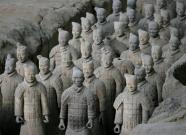
Do the math and save? In -210 Chinese emperor Qin Shi Huang Di (Ch'in Shih Huang Ti) (b. -259) dies suddenly on an inspection tour, and his son Hu Hai becomes Qin emperor #2 of China under the name Qin Er Shi Huang Di (Ch'in Er Shih Huang Ti) (Qin Shihuang) (d. -207); to protect him in the afterlife the Terracotta Army of Emperor Qin Shi Huang Di of 7K lifesize figures (soldiers and horses in military rank) (discovered in 1974) is built in the capital of Xi'an in NW China (at the E end of the Silk Road) in the first emperor's memorial; it takes 700K conscripts 38 years to build; it really belonged to his ancestor Empress Xuan, who died in -314?; Qin Er Shi Huang Di orders his daddy's childless concubines to be buried with him (a "very great" number of people).
In -209 Chinese PM Zhao Gao (d. -207) plots to seize the throne, forcing emperor Qin Er Shi Huang Di to commit suicide in -207; the first peasant rebellion in Chinese history is led by Chen Sheng and Wu Guang Xing, but they are killed.
In -209 Mongolian-born Modu Chanyu (Maodun) (-234 to -174) founds the Hun Confederacy (Xiongnu Empire) in the C Asian borderlands of China among the Xiongnu, which threatens the Hans and dominates C Eurasia (until 100 C.E.).
In -207 Qin Er Shi Huang Di commits suicide, and his nephew Zi Ying (d. -206) becomes Qin emperor #3 (last) of China (until Jan. -206), ordering Zhao Gao's death.

In -206 the unpopular Ch'in (Qin) Dynasty (founded -221) is overthrown by the Han Dynasty (ends 220 C.E.); Zi Ying is executed; Liu Bang (d. -194) and Xiang Yu (-232 to -202) become the first rival emperors of the Xi (Western) Han Dynasty in China under the titles Han Gao Zu and Chu Ba Wang.
In -200 Emperor Han Gao Zu of China makes Chang'an (Changan) in Shaanxi Province near Xi'An at the E terminal of the Silk Road his capital.
In -194 Han Gao Zu (Liu Bang) dies, and weak 17-y.-o. Han Hui Di (-211 to -188) becomes Xi Han emperor #3 of China (until -188); Queen Han Lu Hou takes over the admin., and kills Prince Zho (Zhao) and his concubine Qi.
In -188 Han Hui Di (b. -211) dies, and Han Lu Hou (d. -179) becomes Xi Han emperor #4 of China; Queen Lu Hou stays in charge of the admin., and appoints Chen Ping and Shen Shi Qi as her left and right ministers.
In -179 Han Lu Hou dies, and after the Lu Clan Extermination, prince of Dai Han Wen Di (Liu Heng) (d. -157) (son of Consort Bo, who has no powerful relatives and is known for humility and thoughtfulness) becomes Xi Han emperor #5 of China, appointing Chen Ping (d. -178) and Zhou Bo (d. -169) as his left and right ministers.
In -156 Han Wen Di dies, and Prince Liu Sheng becomes Han Jing Di (-181 to -141), Xi Han emperor #6 of China (until -141).
In -154 the Rebellion of the Seven Kings of Wu and Chu, led by Duke Wu takes place in China after Emperor Han Jing Di kills Wu's son Prince Xian (the emperor's cousin) over a game of Liubo.
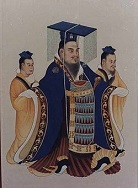
On Mar. 9, -141 Han Jing Di dies, and Liu Che becomes Han Wu Di (-156 to -87), Xi Han emperor #7 of China (until Mar. 29, -87); Han Jing Di is buried in a tomb 95 mi. from Peking in a fabulous jade suit, with 2K plates sewn together with gold wire, along with 2.8K expensive funeral offerings; his wife Tou Wan has to wait until -104 to get her jade immortality suit. In -130 Han Wu Di establishes an admin. with scholars and a civil system; meanwhile Zhang Du's expedition helps open the 4K-mi. Silk Road, stretching from E China through Edessa to the Mediterranean Sea (finished -115).
In -111 China conquers Nam Viet AKA Viet Nam, ending the Trieu Dynasty (begun -208), and renaming the country Giao-Chi (Jiaozhi), ruling Vietnam for 1K years (until 938 C.E.). In -108 China conquers Korea.
In -104 Princess Tou Wan (Douwan) dies, and joins her hubby in her own 208-piece jade suit, which is discovered in 1968; the immortality thing doesn't work, and she crumbles to dust?
In -86 Han Wu Di (b. -156) dies, and Han Zhao Di (d. -74) becomes Xi Han emperor #8 of China.
In -74 Han Zhao Di dies without an heir, and Prince Liu He of Changyi (d. -59) becomes Xi Han emperor #9 for 47 days before being deposed and labelled the Marquess of Haihun (Chin. "maritime incompetence") by minister Huo Guang (d. -68) for the good of the state (first deposition in Chinese history), and rags-to-riches commoner Xuan (-91 to -49), whose grandfather Liu Ju committed suicide after being accused of witchcraft in -91 becomes Xi Han emperor #10 of China (until -49), going on to lower taxes and open up the govt. and fill it with capable ministers.
In -49 Han Xuan Di (b. -91) dies, and Han Yuan (Chin. "discerning") Di (Liu Shi) (-75 to -33) becomes Xi Han emperor #11 of China (until -33), going on to promote Confucianism as the official creed of the govt. while the inlaws of empress Wang Zhengjun (-69 to 13) become powerful.
In -33 Han Yuan Di (b. -75) dies, and his son Prince Ao becomes Chengdi (-51 to -7), Xi Han emperor #12 of China (until -7), going on to let the Wang clan close its grip on power while corruption and greed plague his govt.
In -7 Cheng (b. -51) dies childless, and his nephew Ai (Chin. "lamentable") Di (Xin Liu) (-27 to 1) becomes Xi Han emperor #13 of China (until 1).
In 1 C.E. Ai Di (b. -27) dies childless, and his 9-y.-o. cousin Ping Di (-9 to 6) becomes Xi Han emperor #14 of China (until 5), with learned Confucian scholar Wang Mang (-45 to 23) as regent.
In 5 C.E. teenie Han emperor Ping (b. -9) is poisoned by his regent Wang Mang, who puts infant Han Ruzi Ying (Ying the Kid) (Liu Ying) (5-25) on the throne (until 9), becoming the last emperor of the Western Han (Xi Han) Empire (founded in -206).
In 9 C.E. Wang Mang finally usurps the throne from the Liu family, deposing and killing young emperor Ruzi (b. 5), and founding the Xin (Hsin) (New) Dynasty (ends 23), attempting to found a truly Confucian society by dissolving the large tax-free estates and distributing the land to peasants, and abolishing the sale of slaves and fields, causing many Han families to flee to Vietnam, changing the govt. from bilaterial kin to patriarchal control; too bad, the radical reforms alienate the establishment and are plagued by a string of natural disasters; Wang Mang has a scout bound with bird feathers and launched from a tower, sailing 100m.
In 18 C.E. the Rebellion of Chimei (Red Eyebrows), led by Liu Xuan (d. 25) begins (ends 27) as the Red Eyebrows rebel band of vagrants raises Hell. in 22 members of the Han royal house join the rebels.
In Oct. 23 C.E. a large peasant army attacks Wang Mang's capital of Chang'an, causing him and his 1K courtiers to fight to the last man, after which the imperial palace is sacked.

In 25 C.E. Liu Xuan dies, and Green Woodsmen rebel prince Liu Xiu of Huaiyang goes on to defeat the peasant Chimei (Red Eyebrows) army by 27, reunifying China and becoming Guangwu (Guang Wudi) (Chin. "military restorer") (-5 to 57), emperor #1 of the Dong (Later or Eastern) Han Dynasty; he goes on to institute some land and other reforms to correct the problems that caused the old Xi (Western) Han Dynasty to disintegrate, giving the Han Dynasty another 200-year lease of life; Buddhism is introduced to China, and mild state policies allow the economy to recover; the Yin School of Taoism produces bestselling works, incl. Yu Fang Mi Chueh (Secret Codes of the Jade Room), claiming to be able to visualize a woman's private parts from her facial features - the nose corresponds to what?

In 39 C.E. after a Chinese cmdr. rapes Trung Trac and kills her hubby, Vietnamese sister-queens Trung Trac and Trung Nhi rebel against China, forming an army of 80K men and women, setting up their own independent kingdom next year (until 42) extending from the Hue River N to S China, with court at Me-linh on the Hong River, abolishing the hated Chinese tribute taxes.
In 42 C.E. the Chinese under Gen. Ma Yuan "the Wave Tamer" (-14 to 49) invade pesky Vietnam and conquer sisters Trung Trac and Trung Nhi, along with their female comrade Phung Thi Chinh (who delivers a baby while leading an army, never skipping a beat), who all commit suicide by jumping into a river, becoming symbols of Vietnamese resistance to the Chinese; Vietnam remains under Chinese control until 938.
By 57 C.E. famine has caused the pop. of China to decrease drastically, from 59M in 1 C.E. to 21M. On Mar. 29, 57 C.E. Han Guan Wu Di (b. -5) dies, and his 2nd son Han Ming Di (Ming Ti) (28-75) becomes Dong (Eastern) Han) emperor #2 of China (until 75).
In 66 C.E. Chinese emperor Ming Di orders the construction of the White Horse Temple 3 li (7 mi.) W of Luoyang, named for the horse that carried back the Buddhist sutras, becoming the first Buddhist temple in China; this year or last the emperor's half-brother Prince Liu Ying of Chu (-71) (son of emperor Guangwu of Han) becomes the first noble Chinese Buddhist. Meanwhile in 64 C.E. the first Christians allegedly arrive in China.
In 75 C.E. Han Ming Di (b. 28) dies after ordering that no separate temple to worship him be built (a good money-saving idea, adopted by later Dong Han emperors), and his son Crown Prince Da Liu succeeds as Zhang Di (Chang-ti) (Chin. "polite") (Da Liu) (57-88), Dong Han emperor #3 of China (until 88), going on to reduce taxes and govt. spending, promote Confucianism, and bring a golden age; Ban Chao is sent to explore the Wild West, reaching as far as Persia and Rome.
In 82 C.E. dowager empress Dou ("polite and virtuous") Xin (Zhangde) (-97) (not to be confused with the other empress Dou who dies in 135) alters the Han succession in favor of her brothers Dou Xian and Dou Du, becoming the first time that the clan of the empress rules, setting a precedent; when emperor Zhang Di gets pissed-off at her arrogance, she apologizes for not wearing concubine clothes.
In 88 C.E. Han Zhang Di (b. 57) dies, and his 9-y.-o. son Crown Prince Zhao Liu succeeds as Han He (Chin. "moderate") Di (79-105), Dong Han emperor #4 of China (until 105), presiding over the beginning of the decline of the empire as his adoptive mother dowager empress Dou Xin (widow of Zhang Di) promotes her family into govt. positions and corrupts the govt.
In 92 C.E. He Di overthrows and kills dowager empress Dou Xin's brother Dou Xian (Tou Hsien), and defangs her; too bad, he uses the help of eunuch Zheng Zhong (-107) and his brother Prince Liu Qing of Qinghe (78-106), setting a precedent for future eunuchs to get involved in politics that ends up bringing the Han Dynasty down in 220.
In 97 C.E. Chinese Han gen. Ban (Pan) Chao (32-102) crosses the Tian Shan and Pamir Mts. with a 70K-man army and campaigns against the Huns (Xiongnu), who are harassing the Silk Road; after making an alliance with Parthian king Pacorus II and establishing a base on the shores of the Caspain Sea and another in Antiochia Margiana (Merv) (E outpost of the Parthian Empire), Ban Chao sends envoy Kan (Gan) Ying to Rome (Chin. "Daqin"), but he only makes it as far as the Black Sea before being convinced to turn back by Parthian traders, becoming the Chinese to travel the farthest West in antiquity, later writing the first Chinese account of Europe.
On Feb. 13, 105 Han He Di (b. 79) dies, and his 3-mo.-old son Han Shang (Chin. "short-lived") Di (-106) becomes Dong Han emperor #5 of China (until 106), with dowager empress Deng Sui (Hexi) (Chin. "moderate and pacifying empress") (81-121) (He Di's 2nd wife) as regent, becoming the last effective ruler of the crumbling Dong (Eastern) Han Dynasty.

In 105 Chinese eunuch Cai Lun (T'sai-lun) (50-121) invents felted sheeted fiber paper made of tree bark, hemp, cloth rags, and fishing nets, replacing bamboo and silk tablets - this gives the Jesus Christ scam away, since if he really was the Son of God, and needed his message spread fast, he would have invented papermaking, printing presses, and maybe copyright and trademark protection for his new world-domination church instead of relying on godless heathens to do it for him, and blind luck to transmit the knowledge to his believers?
In Aug.-Sept., 106 Shang Di dies, and 12-y.-o. Prince Hu Liu (grandson of emperor Zhang Di) succeeds as Han An (Chin. "peaceful") Di (94-125), Dong Han emperor #6 of China (until 126), with his stepmother dowager empress Deng Sui remaining as regent until her death in 121; Japan sends an ambassador.

In 121 dowager empress Deng Sui dies, and her stepson An Di immediately purges the govt. of her relatives, making many commit suicide; too bad, he prefers women and drinking to affairs of state, leaving the govt. to his corrupt eunuchs and his wife empress Yan Ji (Ansi) (Chin. "peaceful and deep-thinking empress") (-126) and her corrupt family (first Han emperor to encourage corruption?); meanwhile droughts cause peasant revolts.
In 126 10-y.-o. Prince Bao Liu (only son of An Di) becomes Shun (Chin. "serene") Di (115-44), Dong Han emperor #7 of China (until 144), turning over the govt. to the corrupt eunuchs, who get good eunuch Sun Cheng removed from the capital for trying to stop them. In 128 Sun Cheng returns to the Chinese capital, but never gets anywhere in attempting to reform all the bad eunuchs running the govt. into the ground.

In 132 after being talked out of drawing lots to let the gods decide, 19-y.-o. Chinese Han emperor Shun Di picks his 16-y-o. consort Liang Na (Shunlie) (Chin. "kind and achieving") (116-50) as empress, who goes on to earn a good rep.
In 135 the Dong Han Chinese govt. permits eunuch marquesses to pass their marches to their adopted sons; meanwhile Liang Na's father Liang Shang, Marquess of Chengshi (-141) becomes CIC of the armed forces, beginning the rise of the Liang family. In 136 govt. corruption causes a number of rebellions in S China (until 138); many rebel gens. surrender willingly if the corrupt officials are replaced by Shung Di.
In 138 a eunuch conspiracy against Shun Di is discovered, and Liang Shang intercedes to advocate leniency. In 144 Shun Di (b. 115) dies, and his only son Prince Liu Bing (by Consort Yu) Chong (Chin. "young-ruling") Di (143-5) becomes Dong Han emperor #8 of China, with dowager empress Liang Na as regent; too bad, army CIC Liang Ji is trusted too much, giving him his big chance to do the quick step.
In 145 3-y.-o. Chinese emperor Chong (b. 143) dies after reigning less than 6 mo., and his 7-y.-o. 3rd cousin Zhi (Chin. "upright") Di (138-46) becomes Dong Han emperor #9 of China (until 146).
In summer 146 Zhi Di (b. 138) is poisoned by Liang Ji for blinking at him and calling him "an arrogant general", giving him poisoned soup then refusing his request for water to ease the pain; he then pressures his sister, dowager empress Liang Na to make 14-y.-o. Liu Zhi, Marquess of Liwu (great-grandson of Zhang Di) (fiancee of Liang Ji's younger sister Lian Nuying) the new emperor, and he is crowned Huan (Chin. "diligent") Di (132-68), Dong Han emperor #10 (until 168).
In 166 Chinese univ. students protest govt. corruption and call on Huan Di to remove corrupt officials, but he instead orders their arrest; meanwhile the First Roman Embassy to China is sent along a sea route, and is greeted by Huan Di in Luoyang (2nd in 284) - the original Richard Nixon and Mao?
In 168 Huan Di (b. 132) dies, and 12-y.-o. Ling (Chin. "inattentive") Di (156-89), great-great-grandson of Zhang Di becomes Dong Han emperor #11 of China, with Dowager empress (Huan Di's 3rd wife) Dou Miao (Huansi) (Chin. "diligent and deep-thinking") (-172) as regent; too bad, her Confucian scholar father Dou Wu (-168) and fellow scholar Chen Fen (-168) attempt to curb the eunuchs and install Confucian scholars in govt. posts, and are defeated in battle and commit suicide, and the eunuchs dominate again, with Zhang Rang (-189) as leader of the Ten Eunuchs (Ten Regular Attendants).

In 184 the Yellow Turban Revolt (Yellow Scarves Rebellion) by Taoist (Daoist) leader Zhang Jue (Chang Chueh) (Zhang Jiao) (-184) against the eunuch-controlled Dong Han Dynasty begins (ends 204), causing poor-but-clever (with royal blood in his veins) Liu Bei (Xuande) (161-223) to see his chance and raise a volunteer army to fight the rebels, obtaining the backing of two wealthy horse merchants and gaining several Vs, then being rewarded with appointment as prefect of Anxi in Zhongshan, which he resigns after refusing to work for a corrupt inspector, the fighting more rebels in Jiangsu, which gets him appointed as prefect of Gaotang, after with the 14th cent. novel "Romance of the Three Kingdoms" portrays him as the ideal benevolent ruler.


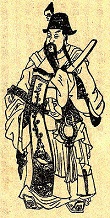
In 189 Ling Di (b. 156) dies, and after #2 eunuch Jian Shuo (-189) sets a trap to kill He Jin (-189), elder brother of empress He (Lingsi) (Chin. "unattentive and deep-thinking") (-189) (Ling Di's 2nd wife) and make Ling Di's younger son Prince Xie Liu the emperor, He Jin learns of it and declares Lang Di's elder son Prince Liu Bian of Hong as Dong Han emperor #12 Shao (Chin. "young") Di (176-90) (until 189), with He and He Jin as regents; too bad, the eunuchs get He Jin assassinated, causing warlord Dong Zhuo (-192) to seize control of the capital Luoyang; hearing the good news, a mob led by pissed-off officials He Jin, Yuan Shao (Benchu) (-202) and Cao Cao (155-220) invades the capital of Liuyang to dispose of the Ten Eunuchs, who get He Jin beheaded in the palace courtyard then kidnap the new emperor and his brother, future emperor Xian Di, but get surrounded, after which head eunuch Zhang Rang jumps in the Yellow River and drowns, and the other eunuchs are executed; Dong Zhuo gains control over the Han Dynasty and moves the capital to Changan, removing Shao Di and making his brother Liu Xie into Dong Hong emperor #13 (last) Xian (Chin. "wise") Di (181-234) (until 220).
On May 22, 192 Dong Zhuo is assassinated by his adoptive son Lu Bu (-198), "the Flying General" (the Chinese Achilles) (master of horseback riding and archery, known for wielding his Sky Piercer atop his steed Red Hare) after a plot by interior minister Wang Yun; Xian Di becomes a puppet of the feuding warlords. In 196 Cao Cao of Wei (155-220) rises to power in China and moves emperor Xian Di to Xu as his puppet, using him to issue edicts as he tries to unify China (until 220). In 198 Chinese Achilles Lu Bu is defeated and captured by Cao Cao in Xiapi, then hanged at the suggestion of Liu Bei.
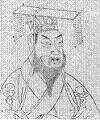
In 204 the Yellow Turban Revolt in China (begun 184) is ended by the generals, who begin to fight among themselves for control. In 208 to stop his southern expansion, Chinese warlords Sun Quan of Wu (182-252) and Liu Bei of Shu (161-223) form a coalition and lead their 25K-50K troops against the 220K-300K troops of Cao Cao of Wei (155-220) at the Battle of Red Cliffs NW of modern-day Chibi (N of Wulin), Hubei, taking advantage of the lack of acclimatization of the northern troops, who suffer a plague, then firing their chained-together ships, burning or drowning most them and defeating Cao Cao.
On Mar. 15, 220 Cao Cao (emperor Wu of Wei) (b. 155) dies of illness, and his son Cao Pi crowns himself as Wei Wen Di (-227), emperor of Wei; Dong Han emperor Xian Di abdicates in favor of warlord Liu Bei (Xuan De) (Xuande) (161-223), who becomes emperor #1 of the Shu Han Dynasty in China (until 223), which rules Sichuan, Guizhou, and parts of Hubei and Gansu; the Han Dynasty, which ruled since 206 B.C.E. collapses, plunging China into 350 years of chaos and disunity, and the Three Kingdoms Period (Wei, Shu, Wu) begins (ends 280) - the Shu's on the other foot? Also in 220 the first known depiction of the preparation of tofu is made in N China - "I love tofu" is no longer obscene on license plates?
In 225 Chinese PM Zhuge Kongming (-234) conquers S Shu - does that include Seoul?
In 227 Wei Wen Di dies, and Wei Ming Di (Cao Rui) (205-39) becomes emperor of Wei (until 239); Japan sends ambassadors; too bad, he goes on to spend excessive amounts on palaces and temples.
In 234 Zhuge Kongming dies, and Fei Wei becomes PM of Shu.
In 239 Wei Ming Di dies, and Wei Fei Di (Cao Fang) (Ts'ao Fang) (231-74) becomes emperor of Wei (until 274), sending an ambassador to Japan.
In 256 Wei Fei Di dies, and Cao Pi's grandson Wei Gao Gui Xian Gong (Yanshi) (Cao Mao) (242-60) becomes emperor of Wei (until 260); Jiang Wei of the Shu unsuccessfully attacks Wei.
In 265 Cao Huan abdicates in favor of Sima Yan, who is crowned Jin Wu Di (236-90) (until 290), founding the Xi (Western) Jin Dynasty in China (ends 420).
In 281 the Bamboo (Ji Tomb) Annals are found in the grave of a Chinese prince, telling about Emperor Yao, who named the 12 signs of the Chinese Zodiac and divided the sky into 28 mansions of the Moon.
In 284 the 2nd Roman Embassy to China is sent by Emperor Diocletian (first 166).
In 290 Jin Wu Di dies, and his retarded son Jin Hui Di (259-307) becomes Xi Jin emperor #2 of China (until Jan. 8, 307).
In 291 the Rebellion of the Eight Kings
In 301 Sima Lun, Duke of Zhao rebels and deposes his grand-nephew Jin Hui Di, then is killed later in the year, and Jin Hui Di restored.
In 304 the Hun Liu Yuan establish the Han Kingdom, beginning the Sixteen Kingdoms Period in China (ends 423).
In 307 Jin Hui Di (b. 259) is poisoned by regent Sima Yue, who becomes Jin Huai Di (Fengdu) (284-313), Xi Jin emperor #3 of China (until 313).
In 311 after forming the Han (Former) Zhao (Northern Han) kingdom in the S part of the the nomadic tribal confederation of the Xiongnu (Hsiun-nu) (Chionites) (Huns?) (a Turkic people?) of the E Eurasian Steppe under Liu Cong (Xuanming) (Emperor Zhaowu of Han/Zhao) (-318), they conquer Leyang and capture Jin Huai Di.
In 313 Jin Huai Di is executed by order of Liu Cong, and Jin Min Di (300-18) becomes Xi Jin #4 (last) emperor of China (until 318).
In 318 Jin Ming Di is executed by emperor Liu Cong of Hang Zhao, ending the Xi Jin Dynasty (founded 265), and Jin Yuan Di (Sima Rui) (Jingwen) (276-323) becomes emperor #1 (until 323) of the Dong (Eastern) Jin Dynasty (ends 420).
In 323 Jin Yuan Di dies, and Jin Ming Di (299-325) becomes Dong Jin emperor #2 of China (until 325), fighting warlord Wang Dun (Chuzhong) (266-324).
In 325 Jin Ming Di dies, and his 4-y.-o. eldest son Jin Cheng Di (Sima Yan) (Shigen) (321-42) becomes Dong Jin emperor #3 of China, with a succession of regents, facing a revolt by gen. Su Jun (-328).
In 342 Jin Cheng Di dies, and Jin Kang Di (322-44) (son of Jin Ming Di and younger brother of Jin Cheng Di) becomes Dong Jin emperor #4 of China (until 344).
On Nov. 17, 344 Jin Kang Di (b. 322) dies, and next year Jin Mu Di (343-61) becomes Dong Jin emperor #5 of China (until 361), with his mother empress Chu Suanzi (Kangxian) ("joyful and wise empress") (324-84) holding real power.
On July 10, 361 Jin Mu Di (b. 343) dies, and Jin Ai Di (Sima Pi) (341-65) becomes Dong Jin emperor #6 of China (until 365), with his granduncle Sima Yu, Prince of Kuaiji holding the real power; the Yan kingdom attacks Leyang, and gen. Heng Wen sends rescuing troops.
On Mar. 30, 365 after becoming obsessed with immortality, Jin Ai Di (b. 341) dies of pills given him by magicians, and his younger brother Jin Fei Di (Sima Yi) (Yanling) (342-86) becomes Dong Jin emperor #7 of China (until 371).
In 371 Jing Fei Di is deposed by gen. Huan Wen (Yuanzi) (312-73) (Duke Xuanu of Nan), and Jin Ming Di's younger brother Jin Jian Wen Di (Sima Yu) (Daowan) (320-72) becomes Dong Jing emperor #8 of China (until 372), spending all of his time in philosophical discussions of Taoism.
In 372 Jin Jian Wen Di (b. 312) dies before proclaiming himself emperor, and Jin Xiao Wu Di (Sima Yao) (Changming) ("filial martial emperor") (362-96) becomes Dong Jin emperor #9 of China (until 396).
In 386 Dao Wu Di (Tuoba Gui) (Tuoba Shegui) (371-409) becomes emperor #1 (until 409) of the Northern Wei Dynasty (ends 534).
In 396 Jin Xiao Wu Di (b. 362) is killed by his concubine Consort Zhang after he insults her, and retarded Jin An Di (Sima Dezong) (382-419) becomes Dong Jin emperor #10 of China (until 419), with his uncle Sima Daozi, Prince of Kuaiji (364-403) holding real power; Nanliang and Beiling establish empires.
In 409 Dao Wu Di dies, and his eldest son Ming Yuan Di (Tuoba Si) (392-423) becomes emperor #2 of the Northern Wei in China (until 423).
In 419 Jin An Di (b. 382) is killed by regent Liu Yu, and Jin Gong Di (-420) becomes Dong Jin emperor #11 of China (until 420), with Liu Yu holding real power.
In 420 Liu Yu forces Ji Gong Di to abdicate, ending the Dong Jin Dynasty (founded 318), and proclaims himself emperor Song Wu Di (Dexing) (Jinu) (363-422) (until 422), founding the Liu Song Dynasty in China (ends 479).
In 421 the Western Liang Kingdom in 16-kingdom China (founded 400) ends. Also in 421 Moron, er, Mormon's son Moroni, last of the Nephite prophet-historians seals the sacred records known as the Book of Mormon (inscribed on gold plates) in a stone box and hides them "up unto the Lord" in a hole in the ground, then returns as an angel in 1823 to visit lucky prophet Joseph Smith in his bedroom on Sept. 21 and tell him where to dig them up on a hill near Manchester, Ontario County, N.Y., and after being prevented for four years by the angel, he finally does it on Sept. 22, 1827, and in just three more years (which makes seven years, natch) the great news is pub. to a grateful world - that, yes, right store, right price, just what you're looking for at a mighty nice price, the original Elvis and the golden record?
In 422 Song Wu Di (b. 363) dies, and his son Liu Yifu becomes Song Shao Di (406-24), Liu Song emperor #2 of China (until 424).
In 423 Ming Yuan Di dies, and his son Tai Wu Di (Tuoba Tao) (Foli) (408-52) becomes emperor #3 of the Northern Wei in China (until 452), going on to unite all of N China and double the size of his kingdom, ending the Sixteen Kingdoms Period (begun in 304), and beginning the Southern and Northern Dynasties Period with the Southern Liu Song (ends ?).
In 424 oncompetent Song Shao Di (b. 406) is deposed and killed by his regents, who make his younger brother Liu Yilong into Song Wen Di (Che'er) (407-53), Liu Song emperor #3 of China (until 453), going on to create a period of prosperity.
In spring 452 Tai Wu Di (b. 408) is assassinated by eunuch Zong Ai, and Tai Wu's 2nd son Tuoba Han becomes Northern Wei emperor #4, but Zong has him assassinated and installs Tuoba Yu, who makes him army CIC, after which he assassinates him; too bad, in the fall Zong is overthrown and cruelly executed along with his clan by a coup led by his former lt. Dugu Ni, who gets Wen Cheng Di (Tuoba Jun) (440-65) installed as emperor #5 of the Northern Wei in China (until 465), reforming the laws to make them more lenient.
In 453 after losing battles against the Northern Wei Kingdom, Song Wen Di (b. 407) is assassinated by his son, crown prince Liu Shao, who becomes Song Liu Shao (Xiuyan) (Yuanxiong) ("prime murderer") (426-53), Liu Song emperor #4; after less than a year his younger brother Liu Jun, prince of Wuling defeats him and becomes Song Xiao Wu Di (Xiulong) (Daomin) (430-64), Liu Song emperor #5 of China (until 464), becoming known for his capable but harsh rule, sexual immorality, and curtailing of the powers of imperial princes and officials.
In 464 Song Xiao Wu Di (b. 430) dies, and Song Qian Fei Di (Ziye Liu) (449-65) becomes Liu Song king #6 of China, going on to stink himself up with sex and violence, and end up assassinated next year.
In 465 Song Qian Fei Di (b. 449) is assassinated, and his uncle Song Ming Di (Liu Yu) (Xiubing) (Rongqi) (439-72) becomes Liu Song king #7 of China (until 472), at first ruling wisely, then stinking himself up by killing off all his nephews and brothers, causing the Liu Song Dynasty to totter on the brink. In 465 Wen Cheng Di dies, and his son Xian Wen Di (Tuoba Hong) (454-76) becomes emperor #6 of the Northern Wei in China (until 471).
On Sept. 20, 471 Xian Wen Di (d. 476) retires in favor of his son Xiao Wen Di (Tuoba Hong) (467-99), who becomes emperor #7 of the Northern Wei in China (until Apr. 26, 499); Xian Wen retains power, becoming the first retired emperor in Chinese history; Xiao Wen introduces forced Sinicization, forcing the pop. to speak Chinese, adopt Chinese surnames, and wear Chinese clothes, changing his family surname in 496 from Tuoba to Yuan and encouraging intermarriage between his Xianbei people and the Han.
In 479 Xiao Daocheng seizes power, assassinating Song Shun Di (b. 467) and ending the Liu Song Dynasty, becoming Qi Gao Di (Shao Doujian) (Xiao Daocheng) (427-82), emperor #1 (until 482) of the Song (Southern) Qi Dynasty (ends 502).
In 482 Qi Gao Di dies, and Qi Wu Di (Xiao Ze) (Xuanyuan) (Long'er) (440-93) becomes Song (Southern) Qi emperor #2 of China (until 493), going on to rule wisely although a bit wastefully, and forbidding marriage between families of the same tribe - that way Chinese won't all look alike?
In 493 Qi Wu Di (b. 440) dies, and his son the prince of Yulin becomes Qi Xiao Zhaoye (Yuanshang) (Fashen) (473-94), Song (Southern) Qi emperor #3 of China (until 494).
In 494 Qin Xiao Zhaoye (b. 473) is assassinated by his granduncle (nephew of Qi Gao Di) Xiao Luan, who makes his brother Price Gong of Hailing into Qi Xiao Zhaowen (Jishang) (480-94), Song (Southern) Qi emperor #4 of China, then has him poisoned and becomes Qi Ming Di (Jingqi) (Xuandu) (452-98), Song (Southern) Qi emperor #5 of China (until 498), going on to kill all the surviving sons of Qi Gao Di and Qi Wu Di, and practice frugality. In 494 Xiao Wen Di moves the Northern Wei capital from Pingcheng to Luoyang, causing a split between his new Sinicized officials and the military establishment centered in the old capital.
In 498 Qi Ming Di dies, and Qi Dong Hun Hou Di (-501) becomes Song (Southern) Qi emperor #6 of China (until 501).
In 499 Xiao Wen Di dies, and avid Buddhist Xuan Wu Di (Tuoba Ke) (Yuan Ke) (483-515) becomes emperor #8 of the Northern Wei in China (until 515); during his reign the kingdom reaches its peak, and Buddhism becomes the state religion.
In 501 Qi Xiao Baojuan (b. 483) is overthrown and killed by gen. Xiao Yan, marquess of Donghun, who puts his younger brother Xiao Baorong on the throne as Qi He Di (Zhizhao) (488-502), Song (Southern) Qi emperor #7 (last) of China (until 502).
In 502 Qi He Di (b. 488) is overthrown and killed by Xiao Yan, ending the Song (Southern) Qi Dynasty (founded 479); Xiao Yan becomes Liang Wu Di (Shuda) (Lian'er) (464-549), emperor #1 (until 549) of the Song (Southern) Liang Dynasty (ends 587), becoming the most stable and prosperous of the southern dynasties; Liang Wu Di becomes known as "the Bodhisattva Emperor", founding univs., patronizing the arts, and embracing both Confucianism and Buddhism, while extending the Confucian civil service; he also bans animal sacrifice and executions.
In 515 Xuan Wu Di dies, and 5-y.-o. Xiao Ming Di (510-28) becomes emperor #9 of the Northern Wei in China (until 528), with his mother dowager empress Hu (Ling) ("unattentive empress") (-528) as regent.
In 528 Xiao Ming Di is poisoned by his mommy Empress Hu for trying to have her lover Zheng Yan executed, causing gen. Erzhu Rong (Tinbao) (493-530) (AKA Prince Wu of Jin) to capture the capital Luoyang and throw her into the Yellow River, then install Xiao Zhuang Di (Yuan Ziyou) (507-30) as emperor #10 of the Northern Wei in China (until 530) while retaining actual power for himself, going on to rebuild the country.
In 530 Xiao Zhuang Di ambushes and kills gen. Erzhu Rong in the royal palace, after which Rong's cousin Erzhu Rong (Rongzong) (500-32) and nephew Ezhu Zhao (Wanren) (-533) defeat and kill him, installing the prince of Guangling as Jie Min (Jiemin) Di (Qianfei) (498-532), emperor #11 of the Northern Wei in China (until 532).
In 532 Gen. Gao Huan defeats and kills Erzhu Rong and his clan and imprisons and kills Jie Min Di, installing Xiao Wu Di (Xiaoze) (Chu) ("the emperor who fled") (510-535) as emperor #12 of the Northern Wei in China (until 535), with Gao Huan wielding actual power.
In 534 Xiao Wu Di rebels against gen. Gao Huan and allies with Gen. Yuwen Tai (Heita), Duke of Anding (507-56), and is chased S into Yuwen's territory, splitting Northern Wei in two, leaving the old Xi (Western) Wei, and the new Dong (Eastern) Wei Dynasty (ends 550), with Xiao Jing Di (Yuan Shanjian) (524-52) (son of Wen's cousin Yuan Dan) as emperor #1 (last).
In 535 the Krakatoa Volcano in Malaysia at 105 deg. E, 5 deg. S explodes, splitting the island of Sumatra asunder and creating the islands of Java and Sumatra separated by the Sunda Strait, reducing daylight to four hours and affecting crop growth for 10 years; did this accelerate the coming of the Dark Ages by encouraging fleas in Africa to multiply, bringing the plague? On Feb. 3, 535 Xiao Wu Di is poisoned to death by Xanbei gen. Yuwen Tai, and his son Wen Di (Yuan Baoju) (507-51) becomes emperor #1 (until 551) of the Xi (Western) Wei in N China (ends 556).
In 540 Vietnam begins a revolt against the Chinese, which is quashed by the end of the cent., causing the Chinese to begin calling it Annam ("pacified south").
In 549 Liang Wu Di (b. 464) is deposed by gen. Hou Jing (Wanjing) (-552), who captures the capital of Jiankang and holds him and his son Jianwen under house arrest, then starves Liang Wu Di to death and places Jianwen on the throne as Liang Jianwen Di (503-51), Song (Southern) Liang emperor #2, then after 10 weeks has him strangled, and his grandnephew the prince of Yuzhang installed as Liang Xiao Dong (Yuanji) (-552), Song (Southern) Liang emperor #3 of China (until 552).
In 551 Wen Di dies, and his son Fei Di (Yuan Qin) (-554) becomes emperor #2 of the Xi (Western) Wei in N China (until 554), struggling under the bootheel of gen. Yuwen Tai.
In 552 Chinese gen. Wang Sengbian (Juncai) (-555), working for Xiao Dong's granduncle (youngest son of Liang Wu Di) Xiao Yi captures Jiankang and has gen. Zhu Maichen throw Liang Xai Dong into the Yangtze River, and Xiao Dong becomes Liang Xiao Ji (Shixun) (Taotie Ji) (508-53), Song (Southern) Liang emperor #4 of China (until 553).
In 553 Liang Xiao Ji (b. 508) is sandwiched between Xiao Ji in the front and Xi (Western) Wei forces in the rear, then defeated and killed, and Liang Yuan Di (Xiao Yi) (Shicheng) (Qifu) (508-555) becomes Song (Southern) Liang emperor #5 of China (until 555).
In 554 Fei Di is deposed and killed by gen. Yuwen Tai, and his younger brother Gong Di (Tuoba Kuo) (537-557) becomes emperor #3 of the Xi (Western) Wei in N China (until 556), a puppet of gen. Yuwen Tai.
In 555 Liang Yuan Di (b. 508) is captured and executed by the Xi (Western) Wei after offending their gen. Duke Yuwen Tai (Heita) (507-56) of Anding, who installs his nephew Xiao Chao as Liang Xuan Di (Lisun) (519-62), Song (Southern) Liang emperor #6 of China (until 562).
In 556 Gong Di is deposed by Yuwen Tai's nephew Yuwen Hu (Sabao) (515-78) (AKA Duke Dang of Jin), ending the Xi (Western) Wei Dynasty (founded 535); Yuwen Hu then installs Yuwen Tai's son Xiao Min Di (Yuwen Jue) (Tuoluoni) (542-57) as emperor #1 (until 557) of the Northern (Bei) Zhou Dynasty (ends 580); Gong Di is disposed of next year.
In 557 Xiao Min Di is deposed and killed by Xianbei gen. Yuwen Hu, who installs his brother Ming Di (Yuwen Yu) (Tongwantu) (534-60) as emperor #2 of the Northern (Bei) Zhou Dynasty in N China (until 560).
In 560 Ming Di is poisoned to death by gen. Yuwen Hu, and his brother (Yuwen Hu's cousin) Wu Di (Yuwen Yong) (Miluotu) (534-72) becomes emperor #3 of the Northern (Bei) Zhou in China (until 572); in 567 he invents Chinese Chess.
In 562 Liang Xuan Di (b. 519) dies, and his son Liang Ming Di (Renyuan) (542-85) becomes Song (Southern) Liang emperor #7 (last) of China (until 585).
In 572 Wu Di is ambushed and captured by gen. Yuwen Hu (-578), who rules as emperor #4 of the Northern (Bei) Zhou in China (until 578).
In 578 Yuwen Hu (b. 515) dies, and his son Xuan Di (Yuwen Yun) (Qianbo) (559-80) becomes emperor #5 of the Northern (Bei) Zhou Dynasty in China (until 580), becoming known for erratic and wasteful rule, and finally going totally insane.

In 580 Xuan Di (b. 559) dies after going looney tunes (forbidding women outside the palace from using cosmetics, and ordering that all wheels be made from a single block of wood), and his Buddhist father-in-law Yang Jian seizes power from his boy son Jing Di (Yuwen Yan) (Yuwen Chan) (573-81), becoming emperor Sui Wen Di (Puliuru Jian) (Naluoyan) (541-604), ending the Northern (Bei) Zhou Dynasty (founded 556), and founding the Sui Dynasty in China (ends 618), which spreads Buddhism while also supporting Confucianism, and creates the greatest period of Chinese prosperity since the Han Dynasty, storing a 50-year supply of food - incl. Elvis Presley bacon-banana-peanut butter sandwiches? In the 580s the iron chain suspension bridge is invented in China. In 589 is the first record of toilet paper in China - not that kind of record, a written record?
In 585 Liang Ming Di (b. 542) dies, and his son Liang Jing Di (Xiao Cong) (Wenwen) becomes Song (Southern) Liang emperor #8 (last) of China until 587, when Mace Windu, er, Sui Wen Di abolishes the Song (Southern) Liang Dynasty (founded 502) and seizes its territory, making Liang Jing Di one of his officials.
In 600 the world's largest cities incl. Constantinople (500K), Chang'an and Lyang in China, Ctesiphon in Persia, Alexandria in Egypt (200K), and Teotihuacan in Mexico (50K). In the 7th cent. C.E. Chinese from Fukien and Kwangtong begin settling Taiwan ("beautiful island"), gradually displacing the native Malaysian aborigines of Polynesian descent, who call the island Pakan. Also in the 7th cent. C.E. the Chinese begin producing the Dibao (Pao), the world's first printed newspaper.

On Aug. 13, 604 emperor (since Mar. 4, 581) Sui Wen Di (b. 541) dies, and on Apr. 11 his 2nd son Sui Yang Di (Yang Guang) (Amo) (569-618) (AKA Emperor Ming) (original name Yang Ying, which is changed when the oracles nix it) becomes Sui emperor #2 of China (until Apr. 11, 618), going on to open relations with Japan and build China's first Grand Canal between the Yellow (Huang Ho) and Yangtze Rivers (20x the length of the Panama Canal?) with 2M workers (finished 610), and also rebuild the Great Wall at the cost of 6M insect worker lives, and the capital Luoyang with another 2M; his three expeditions to Korea each take 1M soldiers, so no wonder the tyrant leaves the empire bankrupt and in revolt.
In 605 the Anji Bridge in Zhao County, Hebel Province, China (begun 595) is finished, becoming the world's oldest segmented arch bridge, surviving to modern times; Europe doesn't build one until the 14th cent.
On Mar. 11, 617 after rebels capture the capital Chang'an, Sui Yang Di (b. 569) is strangled in a coup led by gen. Li Yuan, and on Dec. 18 Gen. Li Yuan installs his puppet Sui Gong Di (Yang You) (605-19) as Sui emperor #3 (last) of China (until June 12, 618); meanwhile his brother Yang Tong claims the throne.

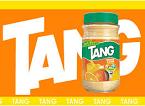
On Apr. 11, 618 after he bankrupts the empire with several military expeditions against Champa (S Vietnam), Koguryo (Goguryeo) (Korea) et al., and loses 6M workers reconstructing the Great Wall of China, a coup led by Gen. Yuwen Huaji (-619) overthrows and strangles Sui emperor #2 (since Aug. 2, 604) Yang Guang (b. 569), declaring Yang You's nephew Yang Hao (586-618), prince of Qin as emperor; on June 12 Gen. Li Yuan overthrows puppet emperor (since Dec. 18, 617) Sui Gong Di (Yang You), ending the Sui Dynasty (founded in 580), and on June 18 becomes Tang Gao Zu (Chin. "high founder") (566-635), emperor #1 (until Sept. 4, 626) of the Tang (T'ang) Dynasty (ends 906) (in which the emperors prefer orange-colored robes?), with capital in Chang'an (Changan) in Shaanxi Province near Xi'An at the E terminal of the Silk Road (founded -200); he goes on to copy Sui Wen Di and redistribute land equally, lower taxes, and reform the judicial system; on June 22 officials in Luoyang declare Yang Tong (Renjin) (604-19), prince of Yue as Sui emperor (until May 23, 619), who is then repeatedly defeated by rebels under Li Mi (Liu Zhiyuan) (Xuansui) (582-619) et al., causing him to get desperate, poison Yang Tong, and declare himself emperor, until he is captured and killed next year by agrarian rebel leader Dou Jiande (573-1621).
On May 23, 619 after Wang Shichong seizes power, Sui emperor (since June 22, 618) yields the throne to him, ending the Sui Dynasty permanently, after which he is killed on Wang's orders.

On Sept. 4, 626 Tang Gao Zu resigns his throne, and his 2nd son Li Shimin becomes Tang Tai Zong (Taizong) (T'ai Tsung) (599-649), Tang emperor #2 of China (until 649), launching a golden age of art and lit. marked by the perfection of the civil service system and the standardization of the you're-so-funny Chinese classics, and becoming known as the #1 emperor in all of Chinese history; cultivation of sugar cane begins after envoys are sent to King Harsha in N India in 647; the southern Chinese are absorbed into the empire, calling themselves the Men of Tang - Lost Boys: The Tribe, buy it today on DVD?
In 635 Nestorian monk Alopen (Olopen) (Olopan) (Olopuen) (Chin. pronunciation of "Rabban") arrives in China with a delegation to Emperor Tsai-Tung, who receives them with respect, hears their yim yam out, and orders the Christian scriptures trans. into Chinese for further study; Alopen founds the first Nestorian Christian mission in China (until the 13th cent.) - we'll take it under, ahem, advisement and get back with you later? In 638 Tai Zhong finishes his examination of Christian scriptures and announces them satisfactory for preaching in his empire, granting Nestorian missionary Alopen the right to preach, and allowing the Qing Jiao (Da Qin) Temple and a monastery to be built in Yining Fang (burnt 845) - it must have been a bad translation?
On July 10, 649 Tang Tai Zong (b. 599) dies, and his son (by empress Zhangsun) Tang Gao Zong (Li Zhi) (628-83) becomes Tang emperor #3 (until 683); the lavish Tomb of T'ai Tsung (Taizong) of Tang is built (626-49); 24-y.-o. empress Wu Zetian is sent to a nunnery, but soon makes a comeback by framing new empress Wang and her head concubine for strangling her infant daughter in 654, getting her deposed in 655 and marrying the new emperor herself, then having their hands and feet cut off and drowned in a well.
In 650 Tang Gao Zong has a stroke, allowing his manly concubine Wu Zetian (-705) to take over, improving farming techniques, reducing taxes and introducing social reforms in a scheme to become the only empress in Chinese history.
On Dec. 27, 683 Tang Gao Zong (b. 628) dies, and after his son Tang Zhong Zong (Li Xian) (Li Zhe) (Wu Xian) (656-710) becomes Tang emperor #4 of China, Gao Zong's 2nd wife Empress Wu deposes and exiles him in less than 2 mo. in favor of his younger brother (her son) Tang Rui Zong (Ruizong) (Jui Tsung) (Li Dan) (Li Xulun) (Li Lun) (Wu Lun) (Wu Dan) (662-716), who becomes Tang emperor #5 of China (until 690), while she wields the real power.

The original Chinese So You Think You Can Dance? In 690 Empress Wu Zetian (Wu Zhao) (625-705) deposes her son Tang Rui Zong, and becomes Tang emperor #6 of China (until 705), becoming the first no-holds-barred Chinese empress, pissing off zillions of male chauvinists, and doubling the aggravation by changing the Tang Dynasty to the Zhou Dynasty; too bad for them, she's more than capable of outgunning the men, so they're in for a long wait for a pair, er, male to sit on the heavenly throne again. Meanwhile in 698 Empress Wu begins persecuting Chinese Christians.
In the 8th cent. C.E. there is a pop. explosion in China, which begins the first large urban developments and becomes aware of the opium poppy via the Middle East and India; Changan (Ch'ang-an), capital city of China is the largest city on Earth; Constantinople is #2; Teotihuacan in Mexico is at its zenith with a pop. of 200K. In the 8th cent. Gunpowder is invented in Tang Dynasty China, with the formula 15-3-2 parts saltpeter-charcoal-sulfur; it is first used for insect fumigants and skin disease treatments, then fireworks, after which it takes a cent. or two to use it in warfare? - the first manmade cis boom bah? Also in the 8th cent. Porcelain is invented in Tang Dynasty China.
On Oct. 8, 701 16-y.o. Chinese princess Yung-T'ai (granddaughter of Emperor Gao Zong), who married the Tang cmdr. of the 2nd rank of imperial carriages, has a son, and seemingly has it made, until she and her husband and brother are overheard by an informer of mean jealous Empress Wu laughing at something, causing the latter to accuse them of a conspiracy and order their death commit suicide.
On Dec. 16, 705 after former emperor #4 (684) Tang Zhong Zong (656-710) returns from exile, regains power from his mean old mother Empress (since 690) Wu Zetian (b. 625), forces her to abdicate, changing the dynasty back to Tang, she dies, and the emperor, sorrowful over the 701 murder of his daughter Yung-T'ai, his son, and son-in-law orders their reburial in a magnificent tomb in the Tang cemetery near Sian, which is rediscovered in 1960, filled with priceless Tang pottery, along with an inscription lying that the princess died in childbirth.
In 706 wall paintings in the Tomb of Prince Zhang Huai in China show the earliest documented proof of Bonsai.
On July 3, 710 Tang Zhong Zong (b. 656) is poisoned by Empress Wei, who puts her youngest son Tang Shang Di (Li Chongmao) (695-714) on the throne as Tang emperor #5, but Zhong Zong's sister Princess Taiping (-713) and nephew Prince Li Longji of Linzi stage a coup, killing Empress Wei, and forcing Shang to abdicate on July 25 in favor of former emperor #5 (683-90) (Li Longji's father) Tang Rui Zong (Ruizong) (Jui Tsung) (Li Dan) (Li Xulun) (Li Lun) (Wu Lun) (Wu Dan) (662-716) (until 712); formal marriage takes place between Tibet and China.
In 712 after consulting astrologers, Tang Rui Zong abdicates in favor of his son Li Longji, who becomes Tang Xuan Zong (685-762), Tang emperor #6 of China (until 756), going on to bring Buddhist China to its pinnacle. In 733 Tang Xuan Zong divides China into 15 sections. In 748 the first printed newspaper appears in Peking - China Today?
The 750s is a time of darkness in Europe and Byzantium, while China enjoys its Golden Age of Poetry and everything else; the Chinese royal stables contain 40K horses for use mainly in polo games? In May-Sept. 751 the Battle of the Talas River (Artiakh) in C Asia is a V by the Arab Abbasids and their Tibetan allies over the Chinese Tang Dynasty under Emperor Xuanzong, giving Muslims control of Transoxiana (W Asia) for the next four cents.; Chinese POWs allegedly teach the Arabs papermaking, resulting in a book and learning explosion after paper manufacture spreads W through the Muslim world, with factories in Samarkand, Baghdad (c. 800), Morocco (c. 1100), and Spain (c. 1150); the Arabs also learn the secrets of sericulture (silk); pesky Bukhara finally becomes Muslim; China begins to fragment into five northern dynasties and 10 southern kingdoms over the next half-cent.
Too bad, China's fortunes begin reversing in the 760s. In 753 a census in China gives the pop. as 52,880,488; in 764 another census after the An Lushan Rebellion gives a pop. of 16.9M - a loss of 36M (70%) in 11 years?; two-thirds still live in N China, but after this the S pop. in the Yangzi Delta begins to catch up.
On Dec. 16, 755 An Lushan (703-57) rebels against the Tang Dynasty, starting the An Lushan (An Shi) (Tianbao) Rebellion (ends 763), causing Jacob, son of the Christian king of the Uighurs to join with Kuang, son of Chinese emperor Hsuan-tsung to put them down; Tang emperor Tang Xuan Zong (Ming Huang) resigns and flees to Sichuan in Shu; poet Tu Fu is captured by the rebels (until 757).
In 756 after fleeing in the opposite direction from his father Tang Xuang Zong (to Lingwu in modern-day Yinchuan, Ningxia), Tang Su Zong (Li Heng) (Li Sisheng) (Li Jun) (Li Yu) (Li Shao) (711-62) is proclaimed Tang emperor #7 (until 762) by the army, going on to quell the An Lushan Rebellion with help from Arab caliph al-Mansur, while beginning the tradition of naming eunuchs to top official positions, starting with Li Fuguo (Li Jingzhong) (Li Huguo) (704-62) (AKA Prince Chou of Bolu), who becomes cmdr. of the imperial guards and rises to #2 in powah. In 757 An Lushan is killed; Tu Fu escapes, is recalled by the new emperor, and becomes a censor, but defends an official from the emperor, and is banished to a small town in Shensi Province as a sub-prefect.
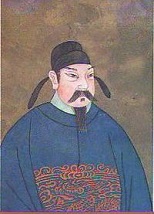
On May 16, 762 Tang Su Zong (b. 711) dies, and on May 18 his devout Buddhist son Tang Dai Zong (Li Chu) (Li Yu) (727-79) becomes Tang emperor #8 of China (until May 23, 779), having pesky eunuch Li Fuguo (b. 704) assassinated on Nov. 8, and forbidding the use of the swastika on silk fabrics; too bad, he spends too much on temples and shrines, bankrupting the empire.
In 779 Lu Yu writes Ch'a Ching, the first definitive book on tea, and the source of the tea service which Chinese Zen Buddhist missionaries later introduce into Japan; wait until the boiling water has bubbles resembling crystal beads rolling in a fountain before pouring over the leaves.
In 779 Tang Dai Zong (b. 726) dies, and his son Tang De Zong (-805) becomes Tang emperor #9 of China (until 805), going on to establish taxes in summer and autumn. In 781 Chinese monks are invited into Tibet, laying the foundation for Tibetan Buddhism. Also in 781 Tang De Zhong erects the Da Qing Monument in Hsi-an-fu to commemorate Alopen and the Christian Nestorian faith, settled in China since 635, which was allowed to develop missionary activities and build monasteries free of the pesky Roman and Byzantine papacies; the Siganfu Inscription at Singanfu, capital of the Tang Dynasty is created by Iezdbouzid, priest and chorepiscopus of Chumdan, chronicling the Nestorian mission in 636-781 (rediscovered in 1623). In 793 a tea tax is introduced. In 805 tea is introduced from China into Japan by Buddhist saint Dengyo Daishi; in 815 Japanese Emperor Saga samples tea at a monastery and likes it so much that he has it cultivated in provinces near the capital, and by the end of the cent. Japan doesn't need to import it from China - how to do the clothes, how to do the hair?
In 805 Tang De Zong dies, and Tang Sun Zong (-806) becomes Tang emperor #10 of China.
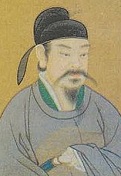
On Sept. 5, 805 Tang Sun Zong dies, and Tang Xian Zong (778-820) becomes Tang emperor #11 of China (until Feb. 14, 820), allowing the eunuchs to seize control.
On Feb. 14, 820 Tang Xian Zong is murdered by eunuchs, who on Feb. 20 install Muzong's eldest son Tang Mu Zong (Li Heng) (Li You) (795-824) as Tang emperor #12 of China (until Feb. 25, 824); after Li Zhongwen is demoted, a rebellion begins.
On Feb. 25, 824 Tang Mu Zong dies, and on Feb. 29 Tang Jin (Jing) Zong (Li Zhan) (809-27) becomes lucky Tang emperor #13 of eunuch-dominated China (until Jan. 9, 827), living in decadence while the eunuchs wield the real power.
On Jan. 9, 827 17-y.-o. Tang Jin Zong (b. 809) is murdered by eunuchs, after which most emperors are installed by eunuchs, starting on Jan. 13 with his younger brother Tang Wen Zong (Li Ang) (Li Han) (809-40), who becomes Tang emperor #14 of China (until Feb. 10, 840) - my emotions are something I just can't tame?
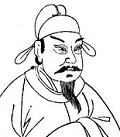
On Feb. 10, 840 Tang Wen Zong dies, and on Feb. 20 the eunuchs install Taoist (Daoist) Tang Wu Zong (814-46) as Tang emperor #15 of China (until Apr. 22, 846), who begins persecuting Buddhists, Manicheans, Mazdeans, and Nestorians.
In 845 the use of paper money in China leads to printing press inflation and state bankruptcy; Tang Wu Zong issues an imperial edict ordering the destruction of all Buddhist temples in China, exiling all monks and nuns, incl. Japanese monk Ennin (794-864); Nestorians are also persecuted.

On Apr. 22, 846 Tang Wu Zong dies, and on Apr. 25 Tang Xuan Zong (II) (Hsuan-tsung) (810-59) becomes Tang emperor #16 of China (until Sept. 7, 859), the last capable one, forbidding Christians to preach in China.
On Sept. 7, 859 Tang Xuan Zong dies, and on Sept. 13 devout Buddhist Tang Yi Zong (Li Wen) (Li Cui) (833-73) becomes Tang emperor #17 of China (until Aug. 15, 873), going on to live in decadence and squander the treasury while levying heavy taxes, resulting in famines that lead to cannibalism and agrarian rebellions.

On May 11, 868 the 16-ft.-long scroll Diamond Sutra, the world's first dated printed book is pub. in Tang China by Wang Jie; opening "Thus I have heard"; ending "Thus shall you think of this fleeing world: A star at dawn, a bubble in a stream, a flash of lightning in a summer cloud, a flickering lamp, a phantom, a dream"; discovered in the Magao Caves of the Thousand Buddhas near Dunhuang in NW China by Hungarian-British archeologist Sir Marc Aurel Stein (1862-1943), who purchases it from a monk guarding the caves - automatically makes the bestseller list?
On Aug. 15, 873 Tang Yi Zong dies, and on Aug. 16 Tang She Zong (Xi Zong) (Li Yyan) (Li Xuan) (862-88) becomes Tang emperor #18 of China (until Apr. 20, 888).
After the govt. fails to help victims of droughts and floods while increasing taxes and wallowing in luxury, the Huang Chao Rebellion in Heian begins (ends 884), becoming the biggest revolt against the Chinese Tang Dynasty, seriously weakening it and setting it up for dissolution within a few decades - there are time deadlines to file your claim?
In 877 rebel chief Biachu captures Canfu, center of the Chinese silk trade, and destroys it, stopping foreign commerce in silk for 60 years; the West has already learned to make silk and doesn't need to throw a pity party? In 878 was the last written reference to Christians in China before the Mongol era.
On Apr. 20, 888 Tang She Zong (Xi Zong) dies, and his younger brother Tang Zhao Zong (Li Jie) (Li Min) (Li Ye) (867-904) becomes Tang emperor #19 (penultimate) of China (until Dec. 1, 900, then 901-4).
In 895 the Fujiwaras become the ruling family in Japan (until 1192), and Japan and China begin drifting apart politically and culturally.
In 903 Zhu Wen (Qiang) (852-912), an ally of dead rebel leader Huang Chao (-884) takes over the Tang capital of Chang'an.On Sept. 22, 904 Zhu Wen deposes Chinese emperor (since Apr. 20, 888) Tang Zhao Zong, and installs boy emperor Tang Zhao Xuan (Ai) (Li Zuo) (Li Zhu) (892-908) (son of Zhao Zong) as Tang emperor (#19) (last) on the Tang throne in Luoyang (until May 12, 907).
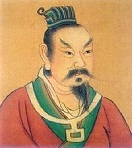
A country that was getting thin is getting fat? In 906 northern invaders end the Tang Dynasty (begun 618), beginning the Five Dynasties Period in China (ends 960); the dynasties (all short-lived military regimes) are Later Liang (907-23), Later Tang (923-34), Later Jin (936-47), Later Han (947-51), and Later Zhou (951-60), ruling the Yellow River Basin; there are also 10 kingdoms in C and S China: Wu, Nantang, Wuyue, Chu, Min, Nanhan, Qianshu, Houshu, Jingnan, and Beiban; on June 1, 907 Zhu Wen (Zhu Quanzhong) (852-912) founds the Later Liang Dynasty (ends 923) after seizing the throne in Kaifeng in his own name, later calling himself Emperor Tai Zu (until July 18, 912); about this time foot binding (lotus feet) catches on?
On Nov. 3, 907 Tang gen. Wang Chien (Jian) (Guangtu) (847-918) seizes control of the Sichuan and Chongqing region, establishing a centralized monarchy in China under the title of Emperor Gazu of (Former) Shut (until July 11, 918).
In 916 Yelu Abaoji (872-926) declares himself emperor of the Mongolian Khitans in NE China, founding the Liao Dynasty (until 1124). In 932 Chinese minister Feng Tao (882-954) orders the printing of the Confucian classics using movable wood blocks, making him the Gutenberg of the East.
In 936 with help from Khitan, Shi Jing Tang crowns himself king in Kaifeng, founding the Later Jin (Hou-Chin) Dynasty in China (ends 947). In 938 the Chinese-speaking Mongolian Annamese defeat the S Han Chinese at the Battle of Bach Dang, freeing Annam (Vietnam) from Chinese control for 1K years (until 1940, except 1407-1428), adopting the name Dai Co Viet (Great Viet State); the Annamese begin driving the aboriginal Caucasoid Chams to the S. In 938 the Khitans leave the old Chinese capital on the Liaotung Peninsula, and establish a new capital at Yanjing (Yenching) (Nanking) ("southern capital") on the site of modern-day Beijing (until 1153). In 939 Ngo Quyen (898-944) declares himself king of Annam (Vietnam).
In 947 Liao Si Zhong becomes king #1 of the Later Han Dynasty (ends 951). In 947 the Mongolians of Khitan take Kaifeng and N China, ending the Later Jin Dynasty (begun 936). In 947 Jews begin settling in China - so that's how they learned to run those family restaurants and laundries?
In 951 the Later Han Dynasty ends, and the Later Zhou Dynasty is founded in China (ends 960).
In 960 Zhao Kuang Yin takes over the Zhou Kingdom, becoming Song Tai Zu (Tai Tsu) (Great Founder) (927-76), emperor #1 of the Bei (Northern) Song (Soon) (Sung) Dynasty (ends 1127), defeating the Tartars; the Golden Era of China begins; the capital is the SE Chinese city of Hangzhou; the Tai Tzu Chang Chuan (great ancestor's long fist) system of martial arts is perfected; the great watercolor painters of the Bei (Northern) Song era flourish.
In 968 Dinh Bo Ling (925-79) founds the Red River, Black River kingdom of Dai Co Viet near the S rim of the Red River plain in Vietnam, with capital at Hoa-lu. In 972 Dinh Bo Ling of Vietnam sends his son to China to establish relations and obtain recognition.
On Nov. 14, 976 emperor (since Feb. 960) Song Tai Zu (b. 927) dies, and Song Tai Zong (Guang Yi) (939-97) becomes Bei (Northern) Song emperor #2 of China (until May 8, 997).
In 979 Le Hoan (941-1005), CIC of the armies of Emperor Dinh Bo Linh hooks up with the queen mother, detrones and assassinates him and his son, and proclaims himself king of Annam (Vietnam), then defeats a Chinese expeditionary force, promising them a tribute every three years in exchange for peaceful relations, and founding the Early Le Dynasty (ends 1009), becoming the first attempt to consolidate Vietnam incl. a new road network.
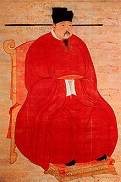
On May 8, 997 emperor (since Nov. 15, 976) Taizong dies, and next Dec. 23 his 3rd son Song Zhen Zong (968-1022) becomes Bei (Northern) Song emperor #3 of China (until Mar. 23, 1022).
In 1009 Le Long Dinh dies, and the Le Dynasty (begun 980) in Vietnam comes to an end after Buddhist monk-raised Ly Cong Uan (Ly Thai-To) (974-1028), cmdr. of the palace guard seizes the throne supported by the Buddhist establishment, founding the Ly Dynasty (ends 1225).
In 1023 Song Zhen Zong dies, and Song Ren Zong (Jen Chung) (-1064) becomes Bei (Northern) Song emperor #4 of China.
In the 1040s Bi Sheng (990-1051) of China invents movable type printing, made of baked clay, and prints calendars.
On July 4, 1054 Chinese astronomers note a "guest star" in the constellation Taurus, the star Zeta Thauri in the Crab Nebula (later known as a source of gamma rays); it is visible in daylight for 23 days and at night for two years; American aborigines see it, along with Arab astronomers, but no European records it - maybe this is a sign that a new country will be born on July 4 in America that will no longer be ruled by the ever-split blindly grasping Mother Church?
In 1054 Ly Thai-tong dies, and his son Ly Nhat Ton (Ly Thanh-Tong) (1023-72) becomes emperor of Vietnam, adopting the ritual trappings of a Chinese emperor, which worries the real one.
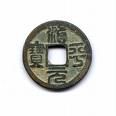

In 1064 Song Ren Zong dies, and Song Ying Zong (Tsung) (-1067) becomes Bei (Northern) Song emperor #5 of China; Chinese scholar Ssu-ma Kuang (Sima Guang) (1019-86) presents him with the 5-vol. Chart of Successive Years (Liniantu), a history of China from the start of the Warring States Period (403 B.C.E.) to the end of the Five Dynasties and Ten Kingdoms Period (959 C.E.); in 1066 he adds 8 more vols., covering from -403 to -207 (end of the Qin Dynasty), turning on the emperor, who orders all imperial libraries opened to him, and provides him with assistants; the next emperor Song Shen Zong changes the title to Comprehensive Mirror to Aid in Government (Zizhi Tongjian), and he completes it in 1084 (10 vols.).
In 1066 China's Khitan (Qi Dan) tribe changes its name to Liao.

In 1068 Song Ying Zong dies, and Song Shen Zong (She-tsung) (-1086) becomes Bei (Northern) Song emperor #6 of China - is that like a Song Shen Blue? In 1069 Chinese chancellor Wang Anshi (1021-86) comes to power, promulgating the New Policies, stressing the well-being of the common people (farmers), and seeking to break up the monopolies and speculators; too bad, after a famine in 1074 his court enemies get him removed in 1075.
In 1086 Song Shen Zong dies, and Song Zhe Zong (-1101) becomes Bei (Northern) Song emperor #7 of China.
In the 12th cent. the rocket is invented in China - that's why it has a red glare?
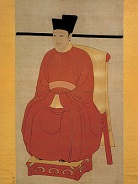
On Feb. 23, 1100 Song Zhe Song dies, and his younger brother Song We Zong (Huizong) (Zhao Ji) (1082-1135) becomes Bei (Northern) Song emperor #8 of China (until Jan. 18, 1126), going on to become an arts lover and the top tea expert in Chinese history.
In 1111 Sung Dynasty Emperor Huizong, a fervent Taoist, in an attempt to establish Taoism as the state religion orders over 1K Buddhist monasteries in the Shandong capital of Kaifeng to be destroyed.
In 1115 the Wanyan clan of the Jurchen (ancestors of the Manchus) found the Jin (Jinn) (Jurchen) Dynasty in Manchuria in NE China (ends 1234).
In 1124 the Tungusic Juchen Manchurians invade China and drive the Mongol Liao Dynasty of Khitan (begun 916) from China, founding the Qara-Khitai (Kara-Khitai) Kingdom in Semirechye (ends 1214).
In Sept. 1125 the Jingkang Incident (Humiliation of Jingkang) begins (ends Mar. 1127) when the Jurchen-led Jin Dynasty sieges and sacks Bian Jing (Bianjing) (modern-day Kaifeng), capital of the Song Dynasty, capturing Emperor Qinzong along with his father Emperor Huizong and many members of the imperial court, causing the Song Dynasty to cede all territories N of the Huai River.
On Jan. 18, 1126 Chinese Song emperor (since Feb. 23, 1100) Huizong (b. 1082) is captured by the Jin Dynasty, going on to spend the last nine years of his life in captivity, dying on June 4, 1135 after Jurchen emperor Taizong gives him the title Duke Hunde (Besotted Duke).
In 1126 Song Wei Zong dies, and Song Qin Zong (-1127) becomes Bei (Northern) Song emperor #9 of China.

On June 12, 1127 after the Manchurians kidnap Song Qin Zong and his father, Gao Zhong crowns himself Song Gao Zong (11007-7), Nan Song emperor #1 of China (until July 24, 1162), with Nan Jing (Najing) (Chin. "southern capital") as the capital; the Northern (Bei) Song Dynasty (founded 960) is replaced by the Southern (Nan) Song Dynasty (ends 1279). Also in 1127 Ly Can Duc dies, leaving no heir, causing Vietnam to degenerate into civil wars for the rest of the cent. (until 1225).
On Jan. 28, 1132 the Southern (Nan) Song Chinese under gen. Han Shizhong (1089-1151 siege and capture a city in Fujian, becoming the first known use of gunpowder cannons.

In 1163 Song Gao Zong dies, and Song Xiao Zong (1127-94) becomes Southern (Nan) Song emperor #2 of China (until 1189).

On Feb. 18, 1189 emperor (since 1162) Song Xiao Zong is forced to abdicate by Zhao Dun, who becomes Southern (Nan) Song emperor #3 Song Guang Zong (1147-1200) (until 1194).


On July 24, 1194 Song Guan Zong is forced to abdicate by Song Ning Zong (Zhao Kuo) (1168-1224), who becomes Chinese Southern (Nan) Song emperor #4 (until Sept. 17, 1224), going on to foster cultural and intellectual achievements by Zhu Xi (1130-1200) et al., while dealing with the pesky Jurchen people in the N and also dealing with inflation. In 1194 the Yellow River in China drastically changes its course from N to S of the Shantung Peninsula.

On Apr. 23, 1200 Chinese philosopher Zhu Xi (Chu Hsi) (1130-1200) dies, leaving Commentaries on the Four Books of Confucius, which forms the basis of Chinese civil service exams in 1313-1905.

In 1206 Temujin ("iron-worker") is acknowledged as the supreme leader of the steppes at a kuriltai (tribal meeting), and given the name Genghis (Chingis) (Jengis) Khan (1162-1227), "emperor of all emperors" (chief prince of the Mongols), invading Manchuria - I don't care, it's 5 o'clock somewhere, let's get going? In 1209 Genghis Khan defeats the Kirghiz and Uighurs, then invades NW China and conquers the Tanguts (Xia) (of Tibetan origin). In 1211 Mongol attacks on the Manchurian Jin Dynasty begin, led by Genghis Khan, who gets the edge when the stupid Jin cmdr. sends messenger Ming-Tan to talk rather than attack first, and he defects and gives away their position at Badger Pass, allowing the Mongols to massacre thousands of Jin troops and win a big V. In 1215 Genghis Khan and 75K men successfully siege the Chinese capital of Chungtu (modern-day Beijing), defended by 600K, finally getting even for cents. of oppression. In 1217 the Mongols conquer the Western Liao Dynasty in China (founded in 1125).


In 1224 Song Ning Zong (b. 1168) dies without an heir, and Song Li Zong (Lizong) (Zhao Yun) (1205-64), who was not in line for the throne but was shoed-in by chancellor (1208-88) Shi Miyuan (1164-1233) and dowager empress Yang becomes Southern (Nan) Song emperor #5 of China (until Nov. 16, 1264), going on to rule for 40 years while spending his time chasing hos and dying without an heir.

On Aug. 18, 1227 after conquering the Hsi-Hsia (Tangut) state in C China (founded 990), Genghis Khan (b. 1162) dies after conquering 4.86M sq. mi. from the Pacific Ocean to the Caspian Sea (incl. N China, Mongolia, S Siberia, and C Asia), and is succeeded by his 3rd son Ogedei (Ogodei) (Ogadai) (Ughetai) (1186-1241) (until Dec. 11, 1241).
In 1234 the Mongols conquer the Jin Dynasty in Manchuria in NE China (founded 1115).



In 1251 Kublai (Khubilai) Khan (1214-94) becomes Mongol gov. of China; Hulagu (Hulegu) (Halagu) Khan (1217-65) begins conquering Persia (until 1265); Mongke (Möngke) (Mangu) Khan (1209-59), son of Genghis Khan's son Tului and a Nestorian woman (elder brother of Kublai Khan and Hulagu Khan) is elected Great Khan by the Mongolian diet (until 1259), going on to hold a series of court debates between Buddhists and Daoists (Taoists), with Confucians sitting in, and the Daoists losing - hosted by Alex Trebek? In 1257 the Mongols attempt to surround the Chinese from the S by invading N Vietnam, but are expelled by next year. In 1260 Kublai Khan succeeds his brother Mongke (Mangu) as Great Khan of the Mongol Empire in N China and parts W, founding the (Great) Yuan Dynasty of China on Noov. 5, 1271 (ends 1368), after first moving the capital to the new city of Shangdu (Xanadu) (Chin. "upper capital") 220 mi. N of Beijing in Inner Mongolia while squabbling over secession.

In 1264 Song Li Zong dies, and his nephew Song Du Zong (1240-74) becomes Nan Song emperor #6 of China (until 1274), going on to face Mongol incursions while indulging in wine and women and leaving affairs to his incompetent minister Jia Sidao; each morning all the babes he's bedded have to come pay their respects, and their number soon mounts to 30? In 1264 Kublai Khan relocates his Mongol capital to Chungto (modern-day Beijing), renaming it Khanbalik (Cambaluc) ("city of the great khan") (until 1368) - did he a stately pleasure dome decree?

Time won't let me wait that long? In 1271 Kublai Khan officially creates the Yuan (Mongol) Dynasty; meanwhile the Polos begin their 2nd trip from Europe to Asia, accompanied by Nicolo Polo's 17-y.-o. son Marco Polo (1254-1324) (ends 1295), stopping in Jerusalem to get oil from the lamp of the Holy Sepulchre as requested by Kublai Khan, then heading through E Turkey (noting that Mt. Ararat is too hard to climb), Georgia (noting "a fountain from which oil springs in great abundance", which is good for burning but no good in a salad), Armenia (with 30 lb.-fat-tailed sheep), Persia (noting the cool soft Kerman "shals"), Badakhshan (seeing salt mined and rubies dug), then via camel along the S Silk Road through the Taklamakan Desert and Great Sand Sea (Gobi Desert) (noting sandstorms and mirages), then Kanchow, homeland of the Mongols, finally reaching Chandu (Xanadu) in 1275, becoming the first Westerners in a generation to cross the Wakhan Corridor to China. What was that about the lights of Broadway? Backward West meets Dazzling East and likes it? In May Marco Polo and his party arrive at Kublai Khan's summer capital of Chandu (Xanadu) N of the Great Wall in Cathay (China), where they stay until 1292, noting that he keeps 10K milk-white horses within the walls of his summer residence; in the fall they accompany Kublai Khan to his winter capital at Peking, where they view his "stately pleasure dome" of violet, green, and vermilion on gilded walls carved with figures of dragons and Buddhas, which has a huge hall capable of entertaining 6K at dinner; the royal dude has 1M retainers, and his New Year's parade features 5K elephants each carrying two coffers of treasure; Marco pleases Kublai's ear with his own stories, and is given free run of Cathay for 17 years, observing spectacles (eyeglasses) in gen. use.

In 1274 Battle of Xiangyang in Hubei Province is a V for the Mongols, who capture the last Nan Song stronghold and close in on what's left of the kingdom; meanwhile minister Jia Sidao hides the fact from whoremaster emperor Song Du Zong, who soon dies happy, and is succeeded by his infant son Song Gongdi (Xhao Xian) (1271-1323), who becomes Southern (Nan) Song emperor #7 of China (until 1276), while his grandmother empress dowager Xie and his mother empress dowager Quan act as regents.

In 1276 after crossing the Yangtze River, the Mongols capture the Nan Song city of Lin An (modern-day Hangzhou), and empress dowager Xie surrenders on the condition that her son Song Gongdi be allowed to live after being demoted to a duke, after which he is ordered in 1289 by Kublai Khan to go to Tibet to become a monk, becoming a great scholar; too bad, he writes a poem expressing his longing to become emperor, causing him to be executed in 1323; meanwhile his older brother Song Duanzong (1268-78) (along with his infant brother Bing) escapes to Fujian on Lantau Island (modern-day Kowloon City) in S China, setting up the govt. in Fuzhou, becoming Southern (Nan) Song emperor #8 of China on June 14 (until 1278).

In 1278 as Mongol forces are about to break through, Chinese emperor Song Duangzong and his minister Lu Xiufu (-1279) flee to Guangdong province, staying in Hong Kong (Chin. "fragrant harbor"); later the Song Wong Toi (Chin. "Terrace of the Song Kings") is erected in Kowloon City in commemoration; too bad, in Mar. Song Duangzong (b. 1268) falls off a boat while fleeting the Mongols and nearly drowns, dying on May 10, and his younger brother Song Zhao Bin (1271-9) becomes emperor #9 (last) of the Nan (Southern) Song Dynasty in China (until 1279).
On Mar. 19, 1279 the Yuan Dynasty of Kublai Khan finishes off the Southern (Nan) Song Dynasty in China (founded 1127) at the Battle of Yamen, where emperor Song Zhao Bin is either KIA or escapes with the fleet of adm. Zhang Shijie across the sea, and founds the Luzon (Lu Song) (Lesser Song) Empire; Lu Xiufu jumps off the cliffs of Mt. Yashan; Kublai Khan sends an emissary to the Vietnamese emperor in Thang-Long (Hanoi) demanding surrender, and when he refuses he begins a war (ends 1288).

In 1294 Chinese Mongol emperor Kublai Khan (b. 1214) dies after killing 18M Chinese, and is succeeded by his grandson Temur Oljeitu (-1307) as Yuan emperor #2 of China (until 1307).

Marco Polo, that Christian, he's a wuss? In 1295 Gaykhatu is strangled by a bowstring to make it bloodless, and his Muslim cousin Baydu (Baidu) (-1295) becomes Mongol Ilkhanid khan #6 of Persia, becoming sympathetic to Christianity and permitting churches, but is assassinated on Oct. 5 by Hulagu's Christian-raised great-grandson (descendant of Mangu) Mahmud Ghazan (1271-1304), who becomes Mongol Ilkhanid khan #7 of Persia, and takes the title Yuan Chen Zong, Yuan emperor of China, converting to Sunni Islam and dumping Christianity because it is the "stronger" religion, making it the official religion and changing his name to Mahmud; with his grand vizier (1298-1318) (a Jewish physician who wisely converts to Islam) Rashid al-Din Hamadani (Tabib) (1247-1318) he attempts to reform the govt., stop overtaxation, restore agricultural land, and integrate the Mongols into the supremacist Islamic mindset, starting by showing them Islam's violent side by destroying Buddhist temples and going back to tried and true restrictions on the rights of pesky Christians and Jews.


In 1307 emperor (since 1294) Temur Oljeitu (Yuan Chen Zong) dies, and his nephew Khaisan (-1311) succeeds as Mongol Yuan emperor #3 of China, taking the title Yuan Wu Zong, with Oljeitu's widow Khanum Bulugan as regent; seven Mongol emperors rule China between this year and 1333.
In 1311 Khaisan (Yuan Wu Zong) dies, and his brother Ayrubarwada becomes Yuan Ren Zong (-1320), Mongol Yuan emperor #4 of China. In 1315 the Chinese civil service exams are reinstated by the Mongols, with built-in discrimination in favor of Mongols and their non-Han supporters against the Hans.
In 1320 emperor (since 1311) Ayrubarwada (Yuan Ren Zong) dies, and his eldest son Shidebala becomes Yuan Ying Zong (-1323), Mongol Yuan emperor #5 of China.
In 1323 emperor (since 1320) Shidebala (Yuan Ying Zong) is assassinated, and is succeeded by Yesun Temur as Yuan Tai Ding Di (-1328), Mongol Yuan emperor #6 of China.

In 1328 emperor (since 1323) Yesun Temur (Yuan Tai Ding Di) dies, and is succeeded by 24-y.-o. Tugh Temur (1304-32), who becomes Mongol Yuan emperor #7 of China, then abdicates after 1 mo. in favor of his elder brother Khoshila, who becomes Yuan Wen Zong (-1329), Mongol Yuan emperor #8 of China. In 1329 emperor (since 1328) Khoshila (Yuan Wen Zong) dies, and his younger brother Tugh Temur (1304-32) becomes Chinese Mongol Yuan emperor #7 again (until 1332).
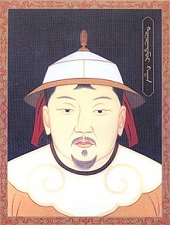
In 1332 emperor (since 1329) Tugh Temur (b. 1304) dies, and is succeeded by Toghon Temur, who becomes Yuan Sun Di (1312-70), Mongol Yuan emperor #9 (last) of China, stirring revolt by starting a strong anti-Chinese program after drought, famine, floods, and plague kill 5M in China in 1333, followed in 1334 by the Black Death, which strikes China's NE Hopei Province, then sweeps along the trade routes to Europe by 1347; by 1351 it kills 20M-30M in Europe (a third of Europe's pop., and up to 60% in some areas), and 75M worldwide by 1361; world. pop. decreases from 450M to 350M-375M by 1400; Europe takes 150 years to return to 1347 pop. levels; it ravages China, halving its pop. from 123M in 1200 to 65M in 1400.
In 1351 there is massive flooding of the Yellow River in China; Liu Futong leads the rebel Red Turban Army in Yin Zhou in a successful rebellion against the Yuan Dynasty (ends 1368).

The plague was actually good for Chinese? In 1352 S Chinese peasant (former Buddhist monk) Zhu Yuanzhang (Yuan Zhang) (Chu Yuan-chang) (1328-98) launches a rebellion against the Chinese Mongol govt. (ends 1368); in 1368 Zhu Yuanzhang leads Chinese rebels from S China to capture Guangzhou, causing Mongol ruler (since 1332) Toghan Temur to flee to Kai Ping (Karakorum); the Yuan Dynasty (founded 1260) ends, and the Ming (Chin. "luminous") Dynasty (ends 1644), vased, er, based in the new city of Nanjing (Nanking) (Chin. "southern capital") begins (ends 1644), becoming the first reunion of China by the S (next time is the Communists in 1948); Zhu Yuan Zhang takes the title Ming Taizu (Tai Tzu) (T'ai Tsu) (1328-98) of the Hong (Hung) Wu (Chin. "vast military") reign, with the motto "Exiling the Mongols and restoring the Han", going on to end the Confucian view of the military as inferior to scholars, promulgate the new Ta (Da) Ming Lu (Chin. "Immutable Laws") law code (completed in 1397), and restore the Great Wall of China, along with a gen. policy of isolation, while the introduction of Western foodstuffs such as wheat and yams causes a 50% pop. increase during his 30-year reign; too bad, he doesn't like merchants, and introduces paper currency, running the presses until he creates inflation.
In 1386 Ming Taizu orders his officials to buy back children sold into slavery in Hainan Province by their parents during a famine. In 1387 Ming Taizu completes the liberation of China from the Mongols.
On June 24, 1398 emperor (since 1368) Ming Tai Tzu (b. 1328) dies, leaving 24 sons, all princes; too bad, inept son Jianwen becomes Ming emperor #2 Ming Hui Di (-1403) (until 1403).
In 1403 emperor (since 1398) Jianwen (Ming Hui Di) is overthrown by his uncle Yung-lo (Yongle), who becomes Ming emperor #3 Ming Chen Zu (Ch'eng Tsu) (-1424) (until 1424), going on to build the Purple Imperial City on the holy mountain of Wu Dang (Wu-Tang) in NW Hubei Province; sections of the Great Wall of China are rebuilt using sticky rice mixed into slaked lime to make it last longer.

In 1405 the pesky Mongols out of his hair, Ming Chen Zu commissions the Seven Voyages of Cheng Ho in the Indian Ocean (ends 1433) in 317 technologically advanced ships with 37K crew in order to impress neighbors, bring states into vassalage, and get treasure and trade goods (dwarfing anything the Euros can match for the next two cents.), all headed by Chinese Muslim royal eunuch adm. Cheng Ho (Zheng He) (1371-1433), accompanied by four officials incl. Ma Huan of Zheng, Fei Xin (Hsin), Gong Zhen (Kung Chen), and Guo Chongli; the First Voyage of 63 ships with 27K men begins (ends 1407).
In 1406 Ming Chen Zu sends messengers to Japan, and occupies Vietnam in an attempt to make it a Chinese province (until 1428). In 1407 China conquers Vietnam again for two decades (until 1428); meanwhile Cheng Ho returns to China from his first voyage with the prince of Palembang (Sumatra) in chains. In 1408 Cheng Ho embarks on his Second Voyage from China to Ceylon (ends 1412); the Chinese occupy Sri Lanka (Ceylon) (ends 1438).
In 1418 rich landlord Le Loi (1385-1433) leads Vietnamese forces against the invading Chinese, and defeats them in 1428.
When I wear black I don't want flakes but I do want healthy hair? In 1420 Chinese Ming emperor Yongle founds Dongchang, and moves his capital from Nanjing to Khanbalik, renaming it Peking ("northern capital") (modern-day Beijing), building a wall around the city, and establishing his court S of the old Mongol court; Tartar City in Peking (begun 1409) is completed; the 178-acre Forbidden City (Tzu Chin Ch'eng = "Forbidden City of the Pole Star") in Peking inside the Imperial City (Huang Cheng) is begun; it is surrounded by a 120-ft. moat and pink-washed walls, and contains the imperial palace and bldgs. roofed with yellow porcelain tile, becoming the home of 24 emperors until 1911; the Great Temple of the Dragon (Heaven) is built in a large tree-shaded park in Peking on the E side of the road leading to the main entrance of Tartar City in a 1-mi.-square enclosure, where the emperor worships periodically - I'm the kind of guy who goes to the zoo and wails on the animals?
On Mar. 8, 1421 Cheng Ho begins his Fifth Voyage from China, scheduled for two years in a fleet of giant 9-masted ships, during which he discovers America?

On Aug. 12, 1424 Ming emperor (since July 17, 1402) Yongle (b. 1360) dies during a campaign against the Mongols, and on Sept. 7 his eldest son Zhu Gaochi becomes Ming emperor #4 of China Ming Ren Zong (Hongxi) (Chin. "vastly bright") (1378-1425) (until May 29, 1425), trying to relax his father's tight centralized admin. control, causing a period of lethargy during his 1-year reign.

In Oct. 1426 the insurgents win a big V against the Ming Dynasty at the Battle of Tot Dong and Chuc Dong;
In 1428 Vietnam regains its independence from China's Ming Empire, with Le Loi (Le Thai-To) (1385-1433) founding the Le Dynasty (ends 1527), calling the country Dai Viet (Great Viet).

In 1431 Cheng Ho (Zheng He) (1371-1433) begins his (last) Seventh Voyage from China, reaching 20 states and exacting tribute from 11 of them, incl. Muhammad's holy city of Heavy Mecca (ends 1433). In 1433 the Chinese Exploratory Voyages begun in 1405 end with the return of eunuch Chinese adm. Cheng Ho from his 7th voyage after having gone as far W as America?; China isolates itself from the "backward" outside world, burns all the ships, shipyards, and records, and makes it a crime to go to sea from China in a multi-masted ship - boy do they have a surprise coming from those *!?*! backward barbarians?
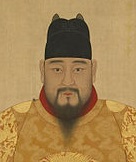
On Jan. 31, 1435 emperor (since June 27, 1425) Xuande (b. 1399) dies, and his son Yingzong (Zhengtong) ("right governance") (Tianshun) ("obedience to Heaven") (1427-64) becomes Ming emperor #6 of China (until 1449), going on to have an interior Great Wall of China built to make it stronger.
On Sept. 8, 1449 Chinese emperor (since 1436) Ming Ying Zong is captured in battle by Esen Tayisi (-1455), chief of the Oirat Mongol 4-tribe confederation at the Battle of Tumu Fortress in Hebei, and after Chinese defense minister and gen. Yu Qian (1398-1457) stops the Mongols 50 mi. from Beijing, the emperor's younger brother Zhu Qiyu becomes Ming emperor #7 of China Ming Tai Tsung (Dai Zong) (Ching Ti) (Jingtai) (1428-57) (until 1457).
In 1450 Ming Ying Zong is released by the Mongols, but his younger brother continues as emperor Ming Tai Tsung, and he is given the title of "grand emperor" and put out to pasture; Ming Tai Tsung goes on to repair the Grand Canal and the dykes on the Yellow River, ruling through minister Yu Qian. On Mar. 14, 1457 Ming Tai Tsung (Zhu Qiyu) (b. 1428) dies, and his elder brother Ming Ying Zong recovers the Chinese throne (until 1464), soon having pesky minister Yu Qian executed, turning him into a folk hero.
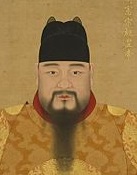
On Feb. 23, 1464 emperor (since 1457) Yingzong (b. 1427) dies, and on Feb. 28 his eldest son Zhu Jianshen becomes Chenghua ("accomplished change") (1447-87), Ming emperor #8 of China (until Sept. 9, 1487), going on to let the eunuchs run all over him, increasing their numbers to 10K and taking over the palace admin. - where did all those balls go?
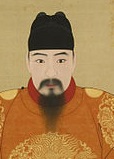
On Sept. 9, 1487 emperor (since Feb. 28, 1464) Ming Xian Zong (Chenghua) (b. 1447) dies, and on Sept. 22 his son becomes Hongzhi ("great government") (Zhu Youcheng) (1470-1505), Ming emperor #9 of China (until June 8, 1505), becoming an ascetic with only one wife and no concubines, who lets affairs of state slide, which is later called the Hongzhi Silver Age.
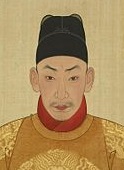
On June 8, 1505 emperor (since Sept. 22, 1487) Hongzhi (b. 1470) dies, and on June 19 his 14-y.-o. eldest son Zhengde ("right virtue") (Zhu Houzhao) (1491-1521) becomes Ming emperor #10 of China (until Apr. 20, 1521), becoming friendly with the Muslims and commissioning Muslim eunuchs to produce blue-white porcelain with Persian and Arabic inscriptions, and being rumored to convert to Islam although his debauched lifestyle denies it; European syphilis reaches Canton; an edict prohibiting the slaughtering of pigs is passed during his reign; eunuch minister Liu Jin (1451-1510), leader of the Eight Tigers group of court eunuchs establishes his power in the Chinese govt., imprisoning 300+ officials and becoming the most corrupt official in Chinese history, the emperor in all but name?
In 1506 ships from France (Fahlanki) enter the Humen (Bogue) (Bocca Tigris) Strait in the Pearl River Delta, and promise tribute; too bad, their noisy cannon piss-off the pop., causing the emperor to order them to leave immediately.
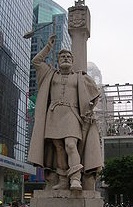
In 1513 the first European ship to land in China is a Portuguese caravel commanded by Jorge Alvares (Álvares) (-1521) that reaches Canton (Guangzhou); later in the year Rafael Perestrello, a cousin of Christopher Columbus is sent by viceroy Alfonso deo Albuquerque in a ship from Malacca, landing on the S shores of Guangdong.
In 1516 the Portuguese introduce maize into China.
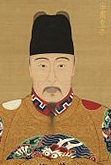
On Apr. 20, 1521 after a 16-year reign in which he overtaxed his people and let bandits flourish while he decimated his court officials for questioning his weird ways and got off on travelling around the country incognito, allowing court eunuchs to entrench themselves inextricably, emperor (since 1505) Ming Zhengde (b. 1491) dies after his pleasure boat capsizes, and on May 27 his 15-y.-o. cousin Zhu Houcong becomes Jiajing ("admirable tranquility") (1507-67), Ming emperor #11 (until Jan. 23, 1567), continuing the same.
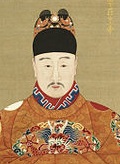
On Jan. 23, 1567 emperor (since May 27, 1521) Jiajing (b. 1507) dies, and on Feb. 4 his speech-impaired son Longqing ("great celebration") (Zhu Zaihou) (1537-72) (AKA the Prince of Yu) becomes Ming emperor #12 of China (until July 5, 1572), going on to attempt to reform corruption and restore trade with Europe, Africa, and Asia and deal with pirates on the Fujian and Zhejiang coasts, repelling the Mongol army of Altan Khan after he reaches Beijing, signing a treaty trading horses fo silk; too bad, near the end of his reign he falls under the spell of Turkic dancer Nu Er Huahua, causing him to abandon official duties for her delights.
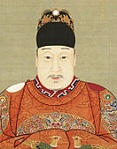
On July 5, 1572 emperor (since Feb. 4, 1567) Longqing (b. 1537) dies, and on July 19 his 3rd son Wanli ("ten thousand calendars") (Zhu Yijun) (1563-1620) becomes Ming emperor #13 of China (until 1620); beginning of the Wan Li Period in Porcelain (ends 1619).


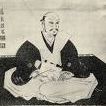




In Jan. 1592 Toyotomi Hideyoshi (1537-98) adopts his nephew Hidetsugu, then retires as regent (tampaku) on Feb. 11, assuming the title of taiko (retired regent); on May 7 the naval Battle of Okpo sees 24 Korean panokson (roofed) ships plus 30 support ships under adm. Ri Sun Shin (Yi Sun-sin) (1545-98) surprise 50 Japanese ships anchored in Okpo Harbor while its troops loot the city, and force a surrender, then on May 8 do ditto at Chokjinpo Harbor; on May 29 (15?) the naval Battle of Sacheon sees adm. Ri Sun Shi first use his technological breakthrough turtle ship (kobukson) (a ramming ship with iron plating or spikes on the deck, which he designed and has constructed on Chon Do Island), attacking 70 Japanese ships in Sacheon with 25 regular ships plus his new secret veapon ship; a Japanese bullet punctures the skin of Ri's left arm in one of the big history what-ifs?; on May 23 the Japanese invade Busan (Pusan) in SE Korea with 7K men under Christian daimyo Konishi Yukinaga (1555-1600) with the aim of conquering the Asian mainland, and the cover story of obtaining safe passage to China, starting the Imjin (Seven-Year) War (ends Dec. 24, 1598); the initial force is mistaken by the Koreans for a trading mission, and has a cake walk, killing 8.5K-30K, then taking Dongnae on May 25 after killing another 3K; eventually 200K men under Kato Kiyomasa (1561-1611) et al. arrive, with the Japanese troops being armed with Euro arquebuses, while the Koreans only have archers; Confucian scholar Ryu Seong-ryong (1542-1607) (you sung wrong?) is appointed Korean PM, in charge of the military, and becomes a big backer of adm. Ri Sun Shin, who on July 8 uses turtle ships to thwart the invasion at the naval Battle of Hansan Island, capturing 47 Japanese ships and destroying 12, and capturing 8K POWs, after which the Korean navy scores continual Vs to undermine Japanese successes on land, with Ri winning all 22 of his naval battles; on Sept. 1 the naval Battle of Busan sees Ri's 60 turtle ships defeat 470 Japanese ships using long-range cannon, while losing only six dead and 25 injured, after which Ri stops the battle to leave the Japanese with some ships to evacuate Korea with; the Japanese introduce tobacco smoking to Korea during their invasion - good for lockjaw?
In 1599 China helps Korea expel the Japanese.
About 1600 the Nguyen Lords (Chúa Nguyen) begin ruling S Vietnam (Cochin China) (until 1800); N Vietnam is controlled by the Trinh Lords; both go on to gobble up all the land to the point of starving the rest of the pop.

The Qing Dynasty forms in the murky corners of Manchuria and feeds on the decay of the Ming Dynasty? In 1615 the Tungusic tribes in E Manchuria expand to eight banners (military regions) under Nurhachi (Nurhaci) (1559-1626), who next year takes the title of Emperor Taizu of the Hou Jin (Later Jin) Dynasty, claiming ethnic descent from the Jurchens of the 12th cent., and takes the clan name Aisin Gioro, founding the Manchu Dynasty in China, later ordering the creation of a written script Manchu Language, using a script borrowed from the Mongolian Ulighur alphabet, which becomes the language of China's official circles; by the mid-19th cent. it begins to be superseded by Mandarin Chinese.
In 1618 Nurhachi makes his move, declaring war against Chinese emperor (since 1573) Ming Shen Zong and proclaiming seven grudges to Heaven, occuping Fushun and Qinghe in Liaodong, then pulling out after killing Ming gen. Zhang Chengyin and setting up a govt. with local Han Chinese assistance.
In Mar. 1619 after Nurhachi unifies all of the Jurchen tribes except the Yehe, and attacks them, causing the Ming emperor to send reinforcments to their aid, the Battle of Sarhu sees 100K Ming troops with Korean reinforcements defeated by 10K Manchus under Nurhachi, who uses superior force concentration tactics to win with cavalry despite the Chinese having matchlocks and cannon, messing up their plans to siege Nurhachi's home base of Hetu Ala.
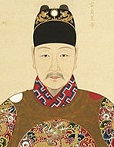
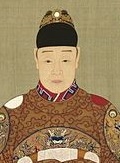
On Aug. 18, 1620 emperor (since July 19, 1572) Wanli (b. 1563) dies after the longest reign of a Ming emperor, and on Aug. 28 his eldest son Taichang ("grand prosperity") (Zhu Changluo) (1582-1620) becomes Ming emperor #14 of China; too bad, on Sept. 26 he dies of diarrhea, and on Oct. 1 his illiterate eldest son Tianqi ("heavenly opening") (Zhu Youxiao) (1605-27) becomes Ming emperor #15 of China (until Sept. 30, 1627), becoming a puppet and devoting his time to carpentry while eunuch Wei Zhongxian (1568-1627) (most powerful Chinese court eunuch in history?) and his nanny/wet nurse Madame Kei (-1627) take power, locking up the teen emperor's concubines and starving them to death; the Donglin Movement arises to protest the govt., along with several popular uprisings, causing Wei Zhongxian to order the torture and execution of Yang Lian, head of the Donglin Academy in Wuxi. In 1621 Li Zi Cheng rebels in China; emperor (since 1620) Ming Guan Zong dies, and Ming Xi Zong (Hsi Tsung) (-1627) becomes Ming emperor #15 of China (until 1627).
In 1625 Nurhachi moves his capital from Liaodong to Shenyang (Mukden) (Shengjing) (Fengtian) (Chen. "city N of the Shen River") on the Hun (Shen) River in NE China, and sets up a civil admin. based on the Chinese model.

In 1626 Nurhachi (b. 1559) dies without realizing his dream of conquering all of China, and his 2nd son Abahai (1592-1643) becomes emperor #2 of the Manchurian Hou (Later) Jin (Chin) (Qin) Dynasty in Mukden, going on to finish daddy's program and absorb Mongol and Han Chinese in NE China into each of their own eight banners, instituting combined Manchu-Mongol-Chinese rule (ends 1911).
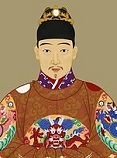
On Sept. 30, 1627 emperor (since Oct. 1, 1620) Ming Tianqi (b. 1605) dies, and on Oct. 2 his younger brother Chongzhen ("honorable and auspicious") (Zhu Youjian) (1611-44) becomes Ming emperor #16 (last) of China (until Apr. 25, 1644); the Manchus invade Korea and place it under vassalage. In 1628 the Jia Ding Christian Conference in China debates on whether to use Latin or Chinese terminology in missionary work, and agrees to use only Chinese terminology.
The mucky clear new Ching Dynasty in China is their last? In 1636 the Manchu clan Aisin Gioro ("Gold Clan") under Abahai of the Later Jin (Chin. "Gold") Dynasty (founded 1616) proclaim the Qing (Ch'ing) (Xing) (Chin. "clear, pellucid") Dynasty in NE China (Manchuria) at Mukden (ends 1911), going on to capture Peking in 1644 and take over the rest of China by 1683; after Emperor Tai Zong demands that Korea accept vassal status and Injo says stuff it, the Manchus invade and make Korea a vassal state; the Ming Dynasty is now in full cookie crumble mode, and the Qins consolidate their position and attack S of the Great Wall when in the mood and the weather permits?
On Jan. 14, 1641 with help from the sultan of Johore, the Dutch take possesion of the Portuguese fort of Melaka (Malacca) (held since 1511) - and the Dutch become the Spice Girls of Europe?; meanwhile after years of bloodshed the Dutch oust the Chinese from Formosa (Taiwan) to control the Sika deer trade, and rule it until 1661. In 1642 Floods in China kill 300K after rebels destroy river dikes in Kaifeng (Hunan Province). In 1643 Chinese bandit ("the Yellow Tiger") Chang Hsien-chung (Zhang Xianzhong) (1606-47) wipes out the pop. of Szechwan Province, killing 40M by 1647.
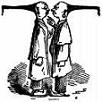
The last Chinese dynasty Qings the cash registers until the eve of WWI? In 1644 a band of rebels led by Li Zicheng (1605-45) captures Beijing, causing emperor Ming Si Zu to ming sizuelf, er, hang himself, ending the Ming Dynasty in China, which ruled from 1368; rather than surrender to the rebels, Ming gen. Wu Sangui (San-kuei) (1612-78) permits the Manchus to cross the Shanhai Pass into China, and they enter Peking and defeat Li Zicheng, founding the Tartar Manchu Qing (Ching) (Ch'ing) (Xing) Dynasty (ends 1912), moving their capital from Mukden to Peking, and going on to build many famous structures; Qi Shun Zhi (Sun Zhi) (-1661), nephew of Dorgon becomes Qing emperor #1 of China (until 1661); the Prince of Lu, the Prince of Fu, the Prince of T'ang, and Prince Yung Ming (1647-62) vie for the imperial throne (until 1659); the era of the Ming Rebels in China begins (ends 1681); the Manchus order the Chinese to shave their heads and wear pigtails (cues) to humiliate them, but it backfires and becomes so popular that they continue to wear them after 1912; otherwise the Manchus work to establish good relations with the Chinese, continuing the Ming govt. structure of six ministries, with the addition of a Manchu Grand Council, military garrisons under eight Manchu banners distributed throughout the empire, and four Han Chinese appointed as govs in the south; meanwhile fast-ripening 30-day turnaround rice is developed, causing a pop. explosion (300M by 1750), with excess pop. spilling into sparsely populated areas incl. Guizhou and Yunnan.
In the 1650s opium smoking becomes a huge problem in China.

On Feb. 5, 1661 emperor (since Oct. 8, 1643) Shun Zhi (b. 1638) dies, and his 8-y.-o. son Xuanye) becomes Qing (Manchu) emperor #2 (#4) of China Qing Kang Xi (Kangxi) (1654-1723) (until 1723); his personal rule begins formally in 1667, but not in fact until 1669, and becomes the longest reign in Chinese history (62 years), marked by spectacular cultural achievement and many major scholarly enterprises, while the emperor makes six tours of his empire to observe local conditions; meanwhile Taiwan pirate leader Zheng Zhilong (b. 1604) is executed in Beijing, and his son Zheng Chenggong (1624-62) succeeds him, becoming known to Europeans as Koxinga from his Chinese title Lord of the Imperial Surname, going on to expel the Dutch from Taiwan (by 1662), becoming a curb-your-enthusiasm Chinese nat. hero.
In 1668 foot binding in China (forbidden in 1638, 1645, and 1662) is finally restricted to Chinese only. In 1673 the Revolt of the Three Feudatories (ends 1681) begins when Ming gen. Wu Sangui (1612-78) and two other Han traitor gens. decide their satrapies in S China aren't enough reward for helping the Manchus take over China, and revolt.
In 1685 Chinese forces begin attacking the Cossack fort of Albazin in the Amur River region, claiming it as their own territory (until 1689). In 1685 all Chinese ports are opened to foreign trade. On Aug. 27, 1689 the Treaty of Nerchinsk (Nierchul) with Russia is China's first treaty with a European nation, stipulating Russian abandonment of Albazin, and an end to military pressure for commercial contacts; their mutual boundary is delineated. In 1727 the Amur frontier between Russia and China is rectified via the Kiakhta (Kyakhta) Treaty, negotiated by Bosnian Serbian Russian minister Count Sava Lukich Vladislavich Raguzinsky (1669-1738) in Peking, governing their relations until the mid-19th cent.
In 1690 Chinese emperor (since 1661) Qing Sheng Zu personally leads the defense of the Khalka states of China in C Mongolia from the forces of Mongol leader Galdan (-1697); in 1697 China conquers W Mongolia, which is incorporated into Qing territory with military colonies established; Galdan poisons himself.
In 1692 Chinese emperor Qing Sheng Zu issues an Edict of Toleration for Christians. In 1694 the British East India Co. acquires monopoly trading rights in Canton, China (until 1834). In 1708 Jesuit missionaries produce the first accurate Western Map of China. In 1709 Taipei (modern pop. 1M) on the Danshui River on N Taiwan Island, home of the Ketagalan tribes is settled by mainland Han Chinese immigrants.
In 1717 the Tibet Revolt (ends 1720) begins with the seizure of Lhasa by Tsewang Rabdan (1697-1727), nephew of W Mongol (Olot) chief Gladan. The Tibet Revolt (begun 1717) is suppressed by armies from Gansu and Sichuan, the Mongols are driven out of Tibet, and Tibet becomes a Chinese protectorate, with a popular Dalai Lama enthroned, protected by imperial garrisons.
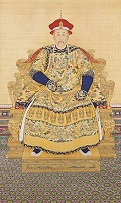
On Dec. 20, 1722 emperor (since Feb. 5, 1661) Qing Sheng Zu (Kang Xi) (b. 1654) dies, and on Dec. 27 Qing Shi Zong (Shih Tsung) (Yongzheng) (Yinzhen) (1678-1735) becomes Qing (Manchu) emperor #3 (#5) of China, founding the Yung Zheng (Cheng) Dynasty (until Oct. 8, 1735), going on to ban Roman Catholicism in China, issuing the first anti-opium edict in 1729, and reducing slavery in China in 1730 while fighting Mongols in the W and cracking down on corruption and financial mismanagement; in 1733 he establishes the Grand Council (Junjichu) ("Office of Military Secrets"), which starts out in charge of military affairs and evolves into a privy council higher in rank than the grand secretariat.

I'm T-N-T, I win the fight, I'm T-N-T, the power of love? On Oct. 8, 1735 emperor (since Dec. 27, 1722) Yongzheng (b. 1678) dies, and his son Hong Lee (Hongli) becomes Qing (Manchu) emperor #4 of China Qian Long (Qianlong) (Ch'ien Lung) (Gao Zong) (Kao-tsung) (1711-1799) (until Feb. 9, 1796), the greatest Manchu emperor of China, forcibly uniting China and establishing a cultural orthodoxy, not to mention insulting the Beatles?; (1711-1799) (until 1796), the greatest Manchu emperor of China, forcibly uniting China and establishing a cultural orthodoxy, not to mention insulting the Beatles?; Tang Ying becomes supt. of the imperial kilns at Jingdezhen, developing the technique of opaque famille rose overglaze enamels and use of red carmine derived from gold. In 1757 Emperor Qian Long decrees the Closed Door Policy for Westerners in China. In the 1760s the tea trade between England and Closed Door China is established. In 1770 the first Norwegian (brown) rats from N China are sighted in the New World, brought by ships; by 1800 they are found in every Euro country, and by modern times they are found in every continent except (knock on Norwegian wood?) Antarctica. In 1774 Chinese emperor Qing Qian Long orders all Chinese works in his gigantic library censored of all derogatory references to the Manchus and their N China predecessors, causing 2.5K works to be destroyed by 1782.
On Aug. 9, 1785 the first recorded Chinese on the East Coast of the U.S. are brought by the ship Pallas.
In Jan. 1789 after the rock-u-like-a-hurricane Tay Son Rebellion sees a Chinese (Qing) army capture Thang Long (Hanoi), the Tay Son army, led by Gen. Nguyen Hue leaves Hue City and scores a V in a surprise attack during the Tet New Year Festival at the Battle of Dong Da Hill in SW Hanoi, uniting N and S Vietnam, after which Hue crowns himself emperor Quang Trung (1753-93) (until 1793), ending the Later Le Dynasty (founded 1428), and founding the romantic Tay Son Dynasty (ends 1802), making 6-tone Vietnamese the official language instead of 5-tone Chinese, distributing land to poor peasants, melting coins to make cannons, and other romantic stuff; too bad, resilient Nguyen leader Phuc Anh's French volunteers arrive in S Vietnam in July, establishing a beachhead and consolidating the area - I love being a Ninja Turtle?
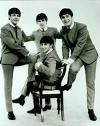


In 1793 King George III of Britain sends the Macartney Embassy (Mission) to China, led by first-ever British envoy Paul, er, George Macartney, 1st Earl Macartney (1737-1806) of Ireland on a 64-gun man-of-war to negotiate a more open trading system and a permanent British embassy, but he is treated with such disdain by Emperor (1736-96) Qin Qian Long (Ch'ien Lung) (1711-99) that it hardens the British to them; imagine, making him kowtow (Chin. "head knock"), and then handing him a worthless rock (jade) as a gift?; on Oct. 7 he leaves after French Jesuit missionary in Peking (since 1750) Jean Joseph Marie Amiot (1718-93) sends him two letters, one of which contains the soundbyte: "This world is the reverse of our own", after which he dies on Oct. 9 - as hard as a Beetle? Don't you know we're more popular than Christ? In 1795 Dutch East India Co. official Isaac Titsingh (1745-1812) (a surgeon and merchant trader) is received with great propriety at the court of Chinese emperor Qin Qian Long just before the celebration of his 60th year of reign, showing up mophead Paul, er, George Macartney of England - tits singing jokes here?

On Feb. 9, 1796 Emperor (since 1736) Qin Qian Long (Ch'ien Lung) (b. 1711) retires, and his son Yongyan (Kia-King) becomes Qing (Manchu) emperor #5 of China Qin Jia Qing (Qing Ren Zong) (1760-1820), issuing the Edict of Peking, forbidding import of opium into China and making opium smoking a capital offense.

Jove knows that I love, but whom, lips do not move, no man must know? Hegel's dialectic launches Euro philosophers into a tizzy for the rest of the cent., and spawns Marxist dialectical materialism and state worship? In 1812-16 German big brain Georg Wilhelm Friedrich Hegel (1770-1831) pub. The Science of Logic (Wissenschaft der Logic) (Die Objektive Logik), about how history is a progressive process from Pure Being (China) to the Absolute Idea (Prussia) (pure thought thinking about pure thought), based on the dialectic (thesis + antithesis = synthesis); "This unity is consequently the absolute and all truth, the Idea which thinks itself"; "The history of the world is the discipline of the uncontrolled natural will, bringing it into obedience to a universal principle and conferring subjective freedom. The East knew, and to the present day knows, that 'one' is free; the Greek and Roman world, that 'some' are free; the German world knows that 'all' are free", therefore America is the land of the future, and the Absolute will reveal itself one day, perhaps in a contest between North and South America", with war being necessary, along with class structures and the state; his 1811 marriage makes him get serious, and this work gets him a job as prof. of philosophy at the U. of Heidelberg in 1816, followed by prof. of philosophy at the U. of Berlin in 1818-31.

In 1816 British ambassador William Amherst, 1st Earl Amherst of Arracan (1773-1857) is snubbed by Chinese emperor (since 1796) Qin Jia Qing when he refuses to kowtow like Lord McCartney did in 1793 - by 2008 the Chinese will be giving out free tickets to the Beatles? No surprise, in the 1820s the Chinese opium trade starts to expand rapidly under British govt.-backed dope pushers.

On May 16, 1820 the frigate USS Congress becomes the first U.S. warship to visit China. On Sept. 2, 1820 emperor (since Feb. 9, 1796) Qin Jia Qing (Yongyan) (b. 1760) dies, and on Oct. 3 Qin Dao Guang (Qing Xuan Zong) (1782-1850) becomes Qing (Manchu) emperor #8 of China (until Feb. 25, 1850).
On July 14, 1837 Chinese Manchu emperor (since 1820) Qin Dao Guan pub. an edict calling for the punishment of opium dealers "without the slightest indulgence" - cut off what? stick it up where?





In 1850 the pop. of China: 430M, Germany: 34M, France: 33M, Spanish-speaking America: 22.5M, Great Britain: 21M, Brazil: 7.2M. In the 1850s Chinese laborers begin migrating to the Malay Peninsula to work in tin mines, with many ending up as coastal pirates. The Euros decide that profit trumps Christ in China? On Feb. 25, 1850 emperor (since 1820) Qin Dao Guan (b. 1782) dies, and on Mar. 9 Qin Xian Feng (Qing Hsien-fung) (Chin. "universal prosperity") (1831-61) becomes Qing (Manchu) emperor #7 of China (until Aug. 22, 1861); after bribing a midwife to coverup her lack of virginity, cagey Manchu babe Cixi (Tzi-Hi) (Tsu-Hsi) (1835-1908) enters his harem as a concubine, 5th rank, then gives him some hot hsien-fung, bearing son (future emperor) Tong Zhi (Tung-chih) in 1856, receiving a promotion to 2nd rank in 1858; when the 30-y.-o. old man dies she proves she's done her homework, going on to virtually rule China for half a cent.; meanwhile S Chinese peasants demanding land and equality, led by Hong Xiuquan (Xichuan) (Hung Hiu-Tsuen) (Hong Huoxiu) (Renkun) (1814-64), a Hakka Christian who had studied under Southern Baptist missionary Issachar Jacox Roberts (1802-70), and had made many converts, becoming Taiping heavenly king next Jan. 11 (until June 1, 1864), claiming to be the brother of Jesus Christ, and becoming known for keeping a Saturday Sabbath and eschewing tobacco and opium, burning it wherever found, begin the 14-year Taiping (Chin. "great peace") Rebellion (ends 1864); Hong Xiuquan proclaims himself emperor of the Taiping Heavenly Kingdom, attacks Peking, and takes Nanking (1854) and Shanghai from the Manchus, making thousands of Christian converts, albeit with a fractured trans. of the Bible; too bad that they destroy all idols, incl. statues of Christian saints and the Virgin Mary, pissing-off the Jesuits, who drag in the French to support the Manchus, and make the U.S. and British missionaries (who together had only made 1.5K converts) jealous, causing them to begin spreading disinfo., calling them pagans and accusing them of atrocities; worse of all, the British get mad at loss of opium revenue and send arms to the Manchus, which PM Gladstone later calls a black mark on British history?; the Taiping Heavenly Kingdom in S China grows to 30M people before it is brutally crushed, with 20M killed by the Qing Dynasty under gen. Zuo Zongtang (Tso Tsung-t'ang) (1812-85) (AKA Gen. Tso).


On Aug. 22, 1861 Chinese emperor (since 1850) Xian Feng (Hien-feng) (b. 1831) dies in Cheng-te in Hopeh Province after the Euros evacuate Peking and he refuses to return, after which his anti-foreigner entourage enters Peking and usurps the throne, causing his supermom (widow) Cixi (1835-1908) to gain help from pro-Western Yixin, 1st Prince Gong (Kung) (Lord Sixth King) (1833-98) and overthrow them, after which her 5-y.-o. son Zai-Chun (Tsai-chun) is enthroned as Qing (Manchu) emperor #8 (#10) Tong Zhi (Tongzhi) (Tung-chih) (Qing Mu Zong) (Zaichun) (1856-75), with both serving as co-regents; Prince Gong and Dong Yuan Chun then establish Cixi as dowager empress and real ruler until her death in 1908, and on Nov. 11 China establishes its first Ministry of Foreign Affairs, which is created as a temporary fix but ends up becoming permanent even after the Commie takeover.

In 1875 emperor (since 1861) Tong Zhi (Tung-chih) (b. 1856) dies without an heir, and his 4-y.-o. cousin (nephew of empress dowager Cixi) Guang Xu (Kwang-su) (Kwang Hsu) (Qing De Zong) (1871-1908) becomes Qing (Manchu) emperor #9 of China, with his uncle Prince Gong as regent (until 1889) under the supervision of supermom empress dowager Cixi, who stays in charge and surrounds herself with good advisers.






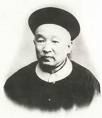
On Oct. 10, 1911 the 1911 Xinhai (Hsin-hai) (Chinese) Rev. (Rev. of the Young Chinese) against the Manchu Dynasty begins when the rev. HQ of the Wuchang org. is discovered plotting against the central railway admin. of Sheng Xuanhuai (1844-1916), and spreads rapidly and bloodily through the W and S; in early Oct. Dr. Sun Yat-sen (Zhongshan) (1866-1925) visits the U.S. to raise money from Chinese immigrants; on Oct. 10 he checks into Denver, Colo.'s Brown Palace Hotel, Rm. 321 (later the Coronet Room), raising $500; he returns to China the next day after reading newspaper headlines saying "Chinese Revolt is Menace to Manchu Dynasty" (Rocky Mt. News), and "Foreigners Throughout Empire in Deadly Peril" (Denver Post); ever after Chinese tourists stop by to see his signature in the guest register; the provinces begin seceding from the Qing Dynasty and join the rev., incl. Jiangsu on Nov. 3, Sichuan on Nov. 22, and Shandong on Dec. 12; on Oct. 14 former Korean resident Yuan Shikai (Shih-K'ai) (1859-1916) is recalled to military command by the Manchu court, and on Nov. 8 is elected PM of the provisional nat. assembly; on Dec. 4 he signs a truce with rebel gen. Li Yuanhong (1864-1928), and sends Tang Shaoyi (1862-1938) as his rep. to negotiations in Shanghai; on Dec. 30 Dr. Sun Yat-Sen, back from the U.S. and Europe is elected provisional pres. of the new Repub. of China (1912-49) by delegates from 16 provinces meeting in Nanking (Nanjing); the Manchu (Great Qing) Dynasty in China (in power since 1644) abdicates; Sun Yat-Sen appoints Gen. Chiang Kai-shek (1887-1975) as his military adviser, with "Dragon Lady" Madame Chiang Kai-shek (Mayling Soong) (1897-2003) waiting in the wings; the calendar is reformed, pigtails are abolished, and (a little late, after 4.5B women's feet are ruined?) foot binding (the golden lotus) is finally outlawed; polygamy begins to decline as marriages for love become common - come all you young maidens and listen to me, never place your affections on a green willow tree?

On Nov. 15, 1908 Dowager Empress Cixi (Tzu-Hsi) (b. 1835), former concubine of Emperor Hsien Feng, who ruled China with poontang power for 50 years dies after a power struggle caused by the emperor's death this year; first she gets her son T'ung Chih ascended to the throne, but he soon dies of smallpox; then she gets his wife Alute overdosed on opium, allowing her to choose the new emperor herself before she dies; her last words: "Never again allow a woman to hold the supreme power in the State"; on Dec. 2 clueless infant Aisingyoro Henry Pu Yi (Puyii) (1906-67) becomes Qing (Manchu) emperor #12 (last) of China (until Feb. 12, 1912).

On Feb. 12, 1912 emperor (since 1908) and Forbidden City inmate Henry Pu Yi (1906-67) abdicates, becoming the last emperor of China; on Feb. 13 Dr. Sun Yat-Sen resigns in order to unify the country, and on Feb. 15 Yuan Shikai is elected provisional pres. of the Chinese Repub. by the nat. assembly. On Mar. 10, 1912 a provisional 1912 Chinese Constitution is completed in Nanking, giving supreme power to the bicameral assembly, causing Pres. Yuan Shikai to begin a power struggle, using the new Jinbudang (Progressive) Party of Liang Qichao, which is opposed by Sun Yat-Sen's new Kuomintang (Guomindang) (Nationalist) Party, a descendant of the Rev. Alliance, which champions parliamentary govt.
On Sept. 13, 1943 Gen. Chiang Kai-shek is elected pres. of the Chinese Repub. by the central exec. committee, and permitted to retain his post as CIC of the Chinese army, announcing that democratic govt. will be established in China after the war.



The Chinese Civil War ends with Mao painting the town Red? On Jan. 1, 1949 Peking (renamed Beijing next year) is taken by the People's Liberation Army without a fight, thanks to the work of Chinese Communist gen. Peng Zhen (1902-97); the Kuomintang collapses, ending the Chinese Civil War (begun Jan. 1946), and by Dec. Gen. Chiang Kai-shek flees with his 600K-man army to Taiwan, vowing to return one day; on Aug. 28 the U.S. State Dept. produces a White Paper on China, claiming that the U.S. had gone as far as an ally could go and that it's all Chiang Kai-shek's fault, becoming the last non-muddled report the U.S. State Dept. produces?; on Sept. 21 prosperous Chinese peasant's son Mao Tse-tung (Zedong) (1893-1976) proclaims the creation of the People's Repub. of China (PRC), with Zhou Enlai (1898-1976) as PM, finally adopting the Gregorian Calendar; on Oct. 1 Mao raises its very very red flag in a ceremony attended by umpteen zillions in Tiananmen Square (Chin. "Gate of Heavenly Peace") in C Beijing, who believe this to be the 2nd greatest event in human history after the 1917 Bolshevik Rev. as they throw off the humiliating yoke of imperialism and capitalism to become slaves of the state?; on Oct. 2 the Soviet Union formally recognizes the PRC; on Dec. 2 Chiang Kai-shek proclaims Taipei, Taiwan as the temporary capital of "real" China; as the years go by, Mao centralizes absolute power to himself, becoming a de facto emperor - the more China changes, the more it stays the same?





